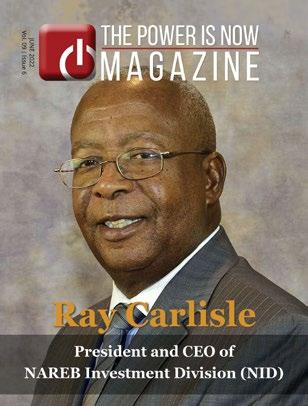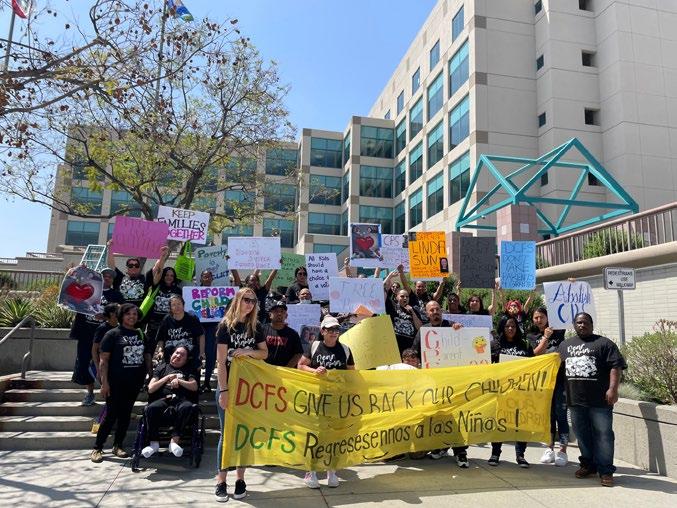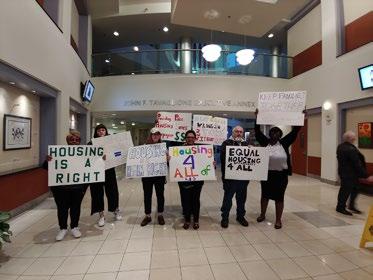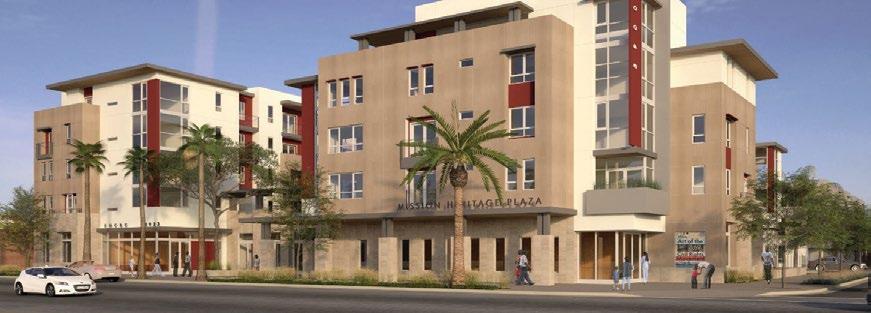Renewed









The Power Is Now Media Inc. 3739 6th Street Riverside, CA 92501 Ph: (800) 401-8994 | Fax: (800) 401-8994 info@thepowerisnow.com www.thepowerisnow.com

The PIN Magazine™ is owned and published electronically by The Power Is Now Media, Inc.
Copywrite 2022 The Power Is Now Media Inc. All rights reserved. “The PIN Magazine” and distinctive logo are trademarks owned by The Power Is Now Media, Inc.
“ThePINMagazine.com”, is a trademark of The Power Is Now Media, Inc.
“Magazine.thepowerisnow.com”, is a trademark of The Power Is Now Media, Inc. No part of this electronic magazine or website may be reproduced without the written consent of The Power Is Now Media, Inc.

Requests for permission should be directed to: info@thepowerisnow.com


Pg. 12. Maybe, Just Maybe… vacant downtown office spaces are what the nation needs to solve the housing crisis.
Pg. 14. A Look at the refinance activity, Mortgage Rates, and the outlook in Q3, 2022.
Pg. 16. Opinion: It’s 2022, can technology replace the human touch?
Pg. 20. How the Medical program is changing lives for low-income patients after years of waiting
Pg. 22. Regulation Nightmares! CFPB on the Hunt for Unlawful nursing home debt collection.
Pg. 8. How the Inflation Reduction Act could be a game changer for the clean energy industry.

Pg. 10. The Inflation Reduction Act wills help families steer through tough times, but what are its long-term impacts?
Pg. 25. Want to keep your VA Loan on track? Here is how. by Sharon Bartlett.

Pg. 29. How long does Appraisals take in Maryland, by Emerick Peace.
Pg. 35. A Look at Florida Housing Market What can we learn: Market stats, Prediction and what the market looks like in 2023, by Adriana Montes.
Pg. 39. 10 things you need to know before buying a home in Arizona, by Yvonne McFadden.
Pg. 43. How much will it cost you to move to or from Arizona?, by Tamra Lee.
Pg. 47. How much is too much when presenting your offer?, by Walter Huff.
Pg. 51. Home renovations that are likely to give you the best returns in Akron, Ohio, by Heith Mohler.
Pg. 55. How can realtors and brokers help if you’ve not been approved for a loan?, by Ruby Frazier.
Pg. 58. Renewed hope for r Civil Rights Institute and Fair Housing Council.
Pg. 65. How do you navigate a tax lien on a home when selling?, by Jenny Gonzalez.
Pg. 69. The biggest mistakes that new Buyers make while House Hunting in Silicon Valley, by Ian Batra.
Pg. 73. Ready to become a homebuyer in Southern California?, by Kamesha Keesee.
Pg. 77. Is writing a real estate offer letter worth it? How to write a winning Offer Letter, by Serina Lowden.
Pg. 81. What is a listing agreement and how will it affect your selling process, by Briana Frazier.
Pg. 87. Up your buyer’s game.How to buy a house even before it hits the market, by Francine Marsolek.
Pg. 91. Getting the Final Stage of Homeownership Right!, by Janet Petrozelle.
Pg. 95. Does it make sense hiring a real estate agent?, by John Costigan.

Pg. 99. Is it possible to negotiate Real Estate Agent Fees? 10 things you must know first, by Norman Green.
Pg. 103. This is how best to price your home in a sellers’ market, by Steven Rivkin.
Pg. 107. Want a Piece of SoCAL?Read this First!, by Decira Pimental.
Pg. 111. Ways to make banks say yes to your REO offer in California today! by Monica Hill.
Pg. 114. The City of Riverside Approves Homeless Action Plan to Deal With Rising Cases of Homelessness.

I want to remain optimistic heading into the fall season as I have throughout the year. In our last edition, I expressed that the third quarter was perhaps one of the toughest quarters I have experienced this far. But even that isn’t enough to shake me off the ground.
Yes, I want to remain optimistic and there are pointers I can already see that reaffirm my position. First, the sky high gas prices are falling consistently in many parts of the country and while for many people the current prices are still somewhat high, it is good enough reason for me to be hopeful about the coming year.
Secondly, I am pleased to announce that The Power Is Now team keeps growing. Jamar James, a name most familiar to the cryptocurrency industry is now a VIP Agent on our platform. I am excited because James brings a wealth of experience to you as a buyer, a seller or even as an investor on how you can incorporate crypto-currencies into your everyday life. Therefore this is a new and exciting frontier for all of us.

Additionally, I am excited to also announce that finally, the Civil Rights Institute has a new home in California which will open its doors towards the end of the month. I am pleased mostly because its a momentous event for us, and i mean us because i sit on the board of directors of the Fairhousing Council of Riverside i feel so proud seeing the remarkable progress and impact that the council has had ever since its founding in 1986, 18 years after the enactment of the Fair Housing Act, for which the council stands to scrutinize. As such, seeing this dream come to life is an honor for me.
In our magazine, we feature the Fair Housing Council of Riverside and the Civil rights Institute and we tell you a little about what these organizations do and what they stand for. We also go into brief details about the president of the FairHousing
Council of Riverside, Rose Mayes. Interestingly, last year in our October issue we also did a profile of The National Association of Advancement of Colored People (NAACP) and its president Derrick Johnson.
We also feature several articles that detail the topic of inflation including how inflation is affecting the clean energy industry, and how it is affecting the family unit. In addition, we also tell you why downtown vacant offices might be the answer we need to solve the housing crisis in our country. This is an issue you cannot miss for anything.
At this moment I would like to thank our readers,
listeners, and contributors for their continued support. We invite you to join us online for invaluable blog posts, engaging radio shows, and the latest issues of our magazines to enhance your learning in the field of real estate, finance, and success. You have the power to change your life, because The Power Is Now.



The Power Is Now Media, Inc.


The Majority leader of the senate, Chuck Schumer, and Senator Joe Machin of West Virginia brought the inflation reduction act. It is a bill focusing on heavy investment in clean energy and solutions to climate change. Included in the act is channeling 370 billion dollars towards climate expenditure which, in return, will reduce 40% of carbon emissions by 2030. Strategies to be used towards achieving clean energy in the reduction act are as follows;
Tax credit for Americans to buy electric vehicles will reduce the energy usually released by vehicles powered by fuels that release carbon dioxide into the atmosphere. The U.S government will give such tax credits under two terms and conditions: for new electric cars, a tax credit will be at $7500, while used vehicles will receive $4000. The inflation reduction act encourages people to adapt to electric cars since they do not release any carbon wastes into the atmosphere.
The bill will not only take into consideration small vehicles, but it will also channel 3 billion dollars to all U.S postal service trucks ensuring they are all electric. Furthermore, $1 billion will be set towards heavy-duty electric vehicles, school buses, and garbage trucks. Similarly, $3 billion set aside will ensure U.S ports release zero emissions to the atmosphere in the fight to adopt clean energy.
The inflation reduction act will also consider home appliances by giving Americans a ten-year consumer tax credit. The bill will also dedicate $9 billion to ensure a discount plan for consumer home energy appliances and environmentfriendly retrofits. By so doing, energy for use at home will be efficient and run smoothly on clean energy by ensuring rooftop solar panels, electric HVAC, and heat pumps are available at more affordable prices.
In the bill, Senate majority leader Chuck
PHOTO FROMSchumer and Senator Joe Machin also included a tax credit that will benefit investors and manufacturers who incorporate clean technology. Examples of such companies are manufacturers of electric vehicles, solar panels, and wind turbines. A tax credit will be essential to them since it will make it easier and encourage them to continue using clean technology and make what they produce more affordable to consumers.
ensure that those who pollute the environment are taxed to fund sufficiently cleaning the environment. To protect and acquire the old-growth forests which serve as essential carbon sinks on the National Forest System land, the act will set aside $ 50 million.
The bill, as indicated, discourages the use of fossil fuels. Still, various provisions will be of merit to the fossil fuel development, such as necessitating charter sales for offshore drilling.
Environment America Washington Legislative office Executive director Lisa Frank in her statement raised the issue that Climate change and other severe environmental challenges are, in one way or another, a barrier to future generations. She encourages people to “create, build and invest,” but most importantly, she encourages people to take care of the natural environment to reduce the worsening heat waves, drought, and fire.
said, “As the saying goes, we do not inherit the Earth from our ancestors. We borrow it from our children.” He also indicated there is a need to rectify climatic change, which is worsening, and infusing the inflation reduction act will act as a game changer and enable the future generation to work in a suitable environment.
Although the bill is not merit, the tax credit will benefit Americans of all colors. It will be an actual game changer. Since the credits are determined to ensure all Americans shift to electricpowered vehicles, install solar panels in their homes, and buy cleaner, more healthy electric appliances that do not pollute the environment in our places of residence and the community.

Besides tax credits, the inflation reduction act is also concerned about methane emissions and includes a program to reduce its release into the atmosphere., there is a plan to
She continues by saying that achieving a “bright future” is still possible by encouraging renewable power and improving clean energy technologies. The inflation reduction act will take part in the journey of having a clean environment by ensuring the process runs smoothly and fast. It also will provide powerful tools to accelerate construction.
U.S PIRG Environment Campaign Director Matt Casale
By making environmental polluters bear the cost of cleaning up superfund sites, most Americans will avoid releasing hazardous wastes to the environment so that they are not taxed.
Lisa Frank also admits that the bill has several shortcomings in that it is a barrier to offshore wind expansion and consequently threatens sea life due to continued offshore drilling. It also does not protect the Arctic National Wildlife Refuge, which is often classified as America’s Serengeti, but the issues will be fixed.
The Inflation reduction act, passed by the National Congress and Signed by America’s President Joe Biden, will make huge investments toward climate change and improve health care. The shift to clean energy and low prescription drug costs will lead to a low cost of living for most Americans by having affordable, safe home energy, electric vehicles, affordable health, and prescription drugs. It will also have long-term impacts that will reform consumer morals and ensure that economy and politics are well aligned.

Asindicated earlier, families will be able to save due to the IRA act. For example, a family comprising four people can save up to $6,700 on health care and energy costs. On the other hand, young adults can save up to $7,700, and elderly couples can save the most money being $17,000.
The viability of saving through the IRA act will be evident when upgrading their home appliances, and incorporating energy-efficient appliances will lower the cost of living and reduce indoor air
pollution.
IRA also makes it possible to acquire tax credits for purchasing electric-powered vehicles. According to consumer reports, EVs save up to $2,600 in annual fuel costs. On the other hand, IRA makes it possible to have affordable health care by allowing health care facilities to bargain on medical prices and ensuring that drug firms do not hike prices more than inflation.
On a long-term basis, the Inflation reduction
act signed by U.S president Joe Biden will be active in several ways. The five most essential outcomes expected are such as;
The law enactment motivates middle-class and low-income people to purchase into a more clean and competitive economy.
For over four decades, the American community has been unsuccessful in strategizing climate proposals in a way that would benefit people of all classes. However, the 2022 IRA act embraces people of all races by giving provisions that will lower household costs of energy and shift energy use and utilization behaviors.
Tax credits on electric vehicles, renewable energy systems, and heat pumps will greatly merit millions of people legible for such distinctions. In the long run, consumers can save up to $1,800 on the energy bill per annum, according to Rewiring America.
Since world war two era, the U.S government has had friendly policies that encouraged the creation of the internet and telecommunications, among others. Inflation reduction encouraged Americans to invest heavily in environmentally friendly technologies or upgrade existing innovations by adapting to clean technology. IRA aims to enhance energy security, reduce carbon gases, incorporate clean technology in transport systems, deliver environmental justice, and support unprivileged communities.
The U.S government will also fund research and development so that 40% of greenhouse gases are reduced by 2030. It will directly participate by penalizing environment polluters and indirectly by having credits on wind technology and other energy programs.
During a Congress which included Senator Joseph Manchin, the IRA designed a law that favored new technologies over existing ones,
mainly in the fossil fuel sectors. As much as petroleum and chemical industries will take part in the journey towards an eco-friendly environment, new and emerging technologies will be favored more while steering competitiveness in the market.
The IRA aims to support the undeserved communities like the 2021 Bipartisan law by prioritizing wind technology and solar energy, significantly benefiting low-income people. IRA will further give construction efficiency refunds and allocate rural development to assist farmers in high-poverty areas. Such programs will encourage the creation of climate justice grants and focus more on improved air pollution monitoring.
Public policy is almost catching up with public opinion with the IRA act. It involves enforcing a pro-consumer and pro-business law that separates the public mind from business and political interests, which aims to preserve income and other inequalities.
The IRA act has left many business people stranded and unsure of which side to take, such as Mary Barra, the CEO of General Motors, who during Obama’s era accepted a bailout on bankruptcy and, During Donald Trump’s era, opposed her commitments. She further opposes the Inflation reduction act due to the corporate tax it entails and the also its environmental provisions.
The government has to be tactful and skillful in managing approved IRA funding over the next decade, ensuring it overcomes all possible challenges. Since IRA is centrally based on capital incentives over-regulation, it allows for successful future economic and political coalitions. New clean technology investments have led to job creation and wage increases among most people, stabilizing the nation to be more eco-friendly at cheaper living costs.
Currently, the U.S is facing a significant housing crisis since both rents and house prices are at or near record high levels. High inventories and the ever-increasing demand are various reasons leading to such instances.
It has also led to the realization that office spaces in prime land are empty and might not get back to full occupancy since most workers have settled on working remotely and thus will never return to their town offices. Workers in expensive cities and costly commute
areas will not get back to their offices and are comfortable working from home.
America is tossing on new norms after the Covid 19 pandemic. Realtors are unsure how to handle the unresolved issue of empty office spaces on prime land, especially in urban areas and the suburbs. Even as most workers return to the office for the first time after the Pandemic, most buildings are half empty, and their future is uncertain.
Some office buildings will
probably be converted to apartments, townhouses, condos, and other facilities. A shift towards converting empty offices to residential places will hugely add stock to the tight market. According to Brian Kropp, Vice President of Research in Human Resources at Gartner, “We’re not going to need as much office space as we have now,” Thus, it would benefit the city if they utilize that space in other ways.
In a survey conducted by Security Systems Company, Kastle office spaces are 43% occupied. Large companies

such as Twitter are downsizing their office spaces since it has allowed their workers to work entirely from home if they choose to. Other mega companies like Apple encourage workers to report to the office at least twice weekly.
Converting offices to homes is not new to Americans. It started in 2010 when the nation was facing significant impacts brought by The Great Recession, and since then, it is something that is being slowly incorporated.
According to the rentals site RentCafe, approximately 8000 units were converted to residential units from offices, particularly in Philadelphia and Washington D.C. 2022 looks forward to receiving 13000 units ready for residential use emphasizing primarily in Los Angeles and Cleveland cities. The act of converting office space to homes could be more rapid due to uncertainties witnessed after The Covid 19 pandemic.
Converting office space to residential units is quite challenging due to the immense work included, the lengthy timelines for the completion of projects, and many regulatory barriers. In most cases, office buildings with the most opportunity are
also the hardest to invest in and thus take longer to complete.
Companies such as financial and legal firms have ordered employees to return to their offices fully five days a week. However, employers also agree that not all employees will agree to return to the office fulltime, especially if it is possible to execute all functions remotely. For example, in New York City, most of its workers work from home, and only less than 40% of the workers return to the office.
In other Cities such as Texas, more than half of the employees had returned to their offices, especially in affordable areas such as Houston, Austin, and Dallas.
Most firms prepared well that about a quarter of their employees will continue to work from home while more than fifty percent of the workers will be hybrid, leaving only a small group of people who will fully return to their offices.
A lot of office space is going to be left unused. Instead of companies having them and catering for rent and other technical services monthly,
it is cheaper to downsize the excess space. So that they fulfill the real estate needs other than leaving such areas unoccupied for an unpredicted duration of time which could extend to over 20 years.
The most probable houses that will be converted to apartments and condos are houses constructed in the 1970 and 80s. Such buildings are considered those of EPC class C and are not modern to suit modern needs, such as indoor and outdoor space and a lot of light, among others. For instance, 550 luxury apartments in Philadelphia were converted from initial office buildings.
There is hope that most empty office spaces will be converted to residential homes encouraging a 24/7 life in most cities. The drive to utilize office towers is beneficial not only to developers but cities as well. As much as office townhouses will be converted to residential homes, there will still be enough space for office use. When workers need to collaborate and work together, young workers, who usually love meeting their colleagues in person, have enough room.
Aswitnessed, refinancing went considerably low compared to previous years. However, mortgage equity withdrawals continue to increase since most people use the second home loan, also known as home equity, to finance their housing.
During Q2 in 2022, cash withdrawals fell to 30%, leading to an increase in home equity lending of 30% quarter over quarter, the highest increase witnessed twelve years ago.
According to the flow of funds report, mortgage debt between May and July 2022 increased to 260 billion dollars. In the past years, mortgage debt declined due to homes sold on short sales and foreclosure wiping out the massive debt. Since part of the debt is used to add stock to the housing market, it cannot be classified as mortgage equity withdrawal.
During Q2 in 2022, mortgage debt was at 1.4 trillion dollars but was 48.9% lower than Q1 as a percentage of gross domestic products, and also slightly higher than during the housing bust. It, therefore, shows that homeowners have considerable home equity, which makes mortgage equity withdrawal, not a bother.
According to calculations carried out by the Fed’s flow of funds data, Net Equity Extraction was 169 billion dollars of the disposable personal income. Equity extraction in the last year increased as compared to previous years.
Mortgage rates are currently constantly moving, both higher and lower. In the last week, mortgage rates lowered slightly, although the new rates are still high shortly after delving into Q3 in 2022. Compared to Q2, specifically in June, mortgage rates were low, and one would have to trace back to 2008 to witness higher rates. Although various improvements were implemented, the impact was not felt because the stock market started to lose ground shortly after a scheduled auction of decade-old treasury notes.
Although a ten-year-old treasury is not associated directly with mortgage rates, it affects bonds that predict the mortgage. The two factors interact well depending on the day
involved since the stock market is differs on different days,
Bonds and rates are used interchangeably and are essential in Fed Fund’s policy. For instance, the approach is more likely to lend loans to a group of people who want the money acquiring mortgage bonds than to people who require a loan for investing in a ten-year treasury.
Fed funds rely heavily on a short life span spectrum which is crucial to all traders and thus the reason why they love dealing with a mortgage since they are more profitable in shorter periods.
Fed funds are also very strategic in tackling inflation. By raising the fund’s rate and making capital costs higher, the flow of credit to enterprises and end users lowers, pushing demand lower and pressuring the market prices.
Such factors are important as far as
mortgage rates are concerned since Fed considers such data when the amount is to be hiked for the Fed fund rate. Higher inflation rates than expected and robust data will lead the Fed Fund rate to hike prices, negatively impacting mortgage rates and making it almost impossible for people to acquire homes.
The high Feds rate predictions are highly dependent on the upward shift in the shorter term, such as mortgage rates. The above principle is inversely proportional to a ten-year treasury.
For the case of Q3, if inflation is going to happen, the Fed fund will thus increase the funding rate and thus lead to higher mortgage rates. Therefore, it indicates that house market prices might increase in the tight market with high demand exceeding supply which is why Q2 experienced decline in financing of homes and opting for equity loans due to the impacts of high inflation. The trend might proceed in Q3 if the issue is not resolved.
Summing up, mortgage rate, Treasury notes, and Fed fund policy work hand in hand directly or indirectly. As a witness in the year’s second quarter, high inflation rates negatively affected homeowners refinancing their homes, leading them to home equity loans resulting from the high living costs.

Mortgage debt increase is also vivid with over 200 billion dollars, the highest debt recorded since 2006. However, as the debt rates rise, the number of new houses continually increases, showing some hope of saving the high inventory levels.
Mortgage debt is taken as part of GDP percentage and prospected to be higher compared to Q1 by 48% and at the same time down 73.3% from the high levels experienced during the housing bust whereby the actual figure was 1.46 trillion dollars from the top.
Although there is a rise in the mortgage equity withdrawal, the percentage is minute as disposable personal income than during the housing bust. Most homeowners have enough equity and mainly rely on home equity lines for equity acquisition.

Everywhere you go these days, there’s the talk of automation and technology replacing the human touch and there is no doubt, technology is surely advancing at a very rapid rate. Focusing on the mortgage production, one thing is clearly evident, the process has become so centralized and very automated and even though the process is a little paper based. Major hallmarks that will soon be the face of this industry have come up changing the tone and shape of the industry.
Everything has become so easy, loan underwriting, using some electronic signatures as well as establishment of user-friendly “portal” which help the users to oversee their loan application and thus faster delivery and approval process which makes it become a mainstream in loan application and delivery. Loan approval has also become very easy and fast, thanks to the automated borrower-verification tools.
We may argue on this issue
but logically, technology has done so much for the economy and has changed the way businesses are run and conducted. But here is what Kermit Randa, CEO of PeopleAdmin has to say about technology and human touch;
“Even as we celebrate the contribution technology makes to helping educators do their job most effectively,” Randa says, “it is important to recognize there is one thing technology
will never replace: the value of the human element in helpings schools, students, and communities succeed …”
However, even if there is so much evolution in mortgage lending and all what goes in and out of this world in so far as technology is concerned, the overall user experience has not gotten better yet. Basically, there are so many challenges that are yet to be overcome. Financing a home for example for many people is still very confusing since most of the consumer or the borrowers are unable to get what they are looking for in terms of help in solving the many puzzles in their head.
some new ways to give their borrower counterparts a combination of technology and human expertise. Therefore, replacing human touch with technology is something that will have to take time.
This should be the time where mortgage experience for the consumer should be improved and given that the country has a very strong job growth rate as well as a stable home-sales, the purchase-loans volume is expected to increase in the current year and the year to come.
Back then when the housing market was doing fairly well, a few consumers were able to get approved mortgage online. It was in this phase the mortgage lenders were in complete dominance of the whole process which was neither automated nor efficient.
But with the technology, the industry has seen enormous changes and a number of innovations and with this improved technology, verification of borrower’s income and the assets are instantaneous. When searching for loans and their pricing, the process has become so easy and very fast, thanks to the new and improved technology.
Everything has become electronic for the improvement of the consumer experience, and what’s even fun, people can now sign disclosures electronically and also, ordering tax transcript from the IRS has become an electronic process.
Technology has done so much for a change in the way things are in so many sectors today but the same old taste of mortgage cannot be replaced, not that easily, reversing this trends will require the lenders to find
But we have to face one fact, even though that all these huge steps have been made for the benefit of the consumer, many of them have been motivated by the needs of the lenders to cut the costs and manage them.

Technology has also enabled the consumers to get access to greater and more informational systems about the mortgages than ever before. Most of the consumers have very little information about mortgages but with the access to the information, they become informed. In some ways, technology may have made the consumers not dependent on the human expertise which they largely depended on to make some of the crucial financial decisions of their lifetime.
With what technology have done and still continuous to do, many borrowers still fill out the forms manually meaning that incorporation of the technology to the process has not well been accepted or the coverage is still very low. Ironically, it turns out that most of the borrowers are interested in a good loan rather than technological touch in mortgage issuing process.
People are going for what not works, simply, their focus is on things that do not show results yet more and more mortgage lenders are putting more emphasis on social media and stuff, however, even though that is great, research from
Mckinsey proves that emails are more effective but as it is, more lenders cannot even respond to a single email within a day.

We all would agree that making the mortgage process faster and much more efficient remains to be at the peak of every lenders but as it is, most of the professionals want to take advantage of the prevailing strong housing market to make a boom in their business.
Online portals, a tool that has been on the rise and many lenders are realizing just how important this tool has been in reaching so many consumers out there. With these portals, consumers can now apply for loans and get approved in a much faster way. Actually, no loan officer is required to oversee the process.
But this tech has a problem, a major drawback and perhaps that may be the number one reason pushing people away from these improvements. If you are a borrower, and say you get stuck on the process, there is no one to help you or if you have a question, there is no one to assist you.
These portals are very important and have seen the success of many mortgage seekers. One thing you will realize is that automation creates consistency and can be applied as an effective tool in helping the loan advancer in seeing the loan advancement to the borrower through.
Can technology replace the human touch? I will surely say that it will depend. Somehow, if you look at what technology has done in the industry in so far as mortgage lending is concerned, there are huge strides that it has enabled and still much credit has been given to the changing technology and its impact. However, none of that would ever be possible without human engagement. The whole process needs human touch since humans are the source of the ideas while tech is just a facilitator of the tech. Therefore, even though automation has well been encouraged, overly, it cannot replace the human touch but we can still push for more and more digital mortgages and responsive tools and in doing so most borrowers should understand that many people are looking for the right mortgage rather than a fast one.





Medi-Cal is a medical program initiated in California and aims to help middle to low-income patients by partly costsharing medical costs. Medical is essential as it will help caregivers ease the high price of taking care of older relatives at critical times when people are struggling with jobs and also taking care of their younger ones. It will also reduce the burden on senior citizens who lack a stable income and cannot fully cater to assisted living expenses.
Two U.S residents, Chelsea Oruche and Kelsey McQuaid, face challenges in caring for their parents. In Chelsea’s case, her mother is seventy years of age, and taking care of her is pretty cumbersome since she has a young kid going to school, and at the same time, she is attending a law school. Due to her mother’s old age, she deserves better health care and attention, and Chelsea does not have the experience.
Kelsey McQuaid’s case is similar to Chelsea’s in that her mother, who is 67, also needs assistance, and her wife expects a child. Kelsey’s family finds it challenging to give their mother full-time care and attention, especially because she has Dementia and also needs a memory care program.
The above incidences are common among most American families. In the next decade, demographics show that more than a quarter of the people in California will be above 65 years of age and thus require special care and attention. Aided living and memory care facilities are expensive, ranging from about $5,000 to $7000 each month. The prices remain high even for people that receive more income and could be said to be living comfortably. Medi-Cal programs have been of help and a source of hope for caregivers and seniors. So far, it is active in 15 counties, Los Angeles and Sacramento.
There is high demand for the Medi-Cal program, and although it is expanding, many people will wait up to one year before they benefit from the plan and are put in an assisted living center. Some people who will benefit from the Medi-cal plan have been waiting since 2019, indicating that patience is necessary to be a beneficiary.
Recently collected data showed that over 6,000 people are registered under the MediCal assisted living programs while over 4500 people are waiting to be enrolled. Assisted living programs are helpful, especially for people with
special needs and physical disabilities. Demand and supply.
As indicated earlier, demand is high while supply is still insufficient to care for almost all families requiring special care and can no longer take care of themselves, especially the low-income seniors. Thus, there is a need to put up more facilities to reduce the number of people on the waitlist and make life easier for most people in the long run.
Needs for more facilities led California to seek permission from the federal government to add 7,000 spots for older citizens. Medi-Cal needed to seek consent since the state and federal governments fund them. Hopefully, by February 28, 2024, the waitlist will reduce by Medi-Cal admitting more people into their facilities.
The success of Medi-cal is also dependent on external factors such as the availability of beds and continued supply and demand. Medi-Cal aims to align assisted medical services, making them easily accessible for people of all classes. Medi-Cal is a program that partially pays for older seniors leaving them to cater for bed and board fees. Although the health program has existed for quite some time, most Californians are unaware of the initiative. According to advocates, need is more critical than waitlist numbers. They emphasize that most people should be knowledgeable about the program to understand
it better.Maura Gibney, a California Advocates for Nursing Home Reform director, classifies Medi- Cal as an opaque initiative since most Californians are unaware of its merits. The conclusion was based on the low outreach vivid among citizens.
Medi-Cal is primarily for seniors who require full-time attention but necessarily do not require it in a clinical facility for occupancy. More than 50% of older people and those with disabilities require full-time help and assistance in their daily activities. Roughly 20% need help with personal activities like eating, bathing, and even clothing, while 40% of the seniors also require this help but are not receiving any. Qualified people, such as those with disabilities, benefit from Medi-Cal assisted living.
Seniors already benefiting from Medi-Cal can be enrolled in assisted living facilities in two ways: either as a transfer from a nursing home (to enable the state to save more money) or after being discharged from the hospital. Such individuals are prioritized and do not have to get on the waitlist.
Other means that lead to people not being put on the waitlist are consulting the Adults Protective Service Agencies, which was practical and of great assistance to McQuaid and his family.

The Consumer Financial Protection Bureau is a financial office whose primary attention is channeled towards older Americans protecting their finances and enabling them to make sound decisions on matters regarding their capital as far as age is concerned. CFPB aims to address and safeguard older citizens from risk emerging from consumer protection and ensure consistent and effective enactment.
CFPB worked toward protecting older citizens and conducted a survey that put together the challenges nursing home residents and caregivers encounter, which in turn cause financial harm to consumers. A part of CFPB’s results was on home debt collection practices that home expert nurses carry out, lawful aid, and elderly law attorneys.
Collecting debt unlawfully affects family members and friends. There are over 40 million people who take care of older pals catering to their health and functional needs. Nearly one person in every six is responsible for an aged relative or a friend. In as much as the National Home Reformation Act does not allow non-residents to add personal responsibility for the resident’s care cost, it has become a common issue as a result passed by some nursing homes.
Consequently, such nursing homes have severe forms of punishment for friends and relatives with arrears. For instance, they can either sue such people in court, hire debt firms to collect payments, or worse, report debt to a firm that deals with credit reports so that their credit score is altered negatively. The rules are based on the “responsible act,” signed by the person assisting the resident with the admission process. Some of the negative results of the act are that it can lead to bankruptcy and foreclosure on homes of people responsible for older relatives in nursing homes.
The high cost of a nursing home will probably lead older people who need aid to run into debt. In most cases, the average price of a nursing home is slightly above $100,000, which has been so from 2004 to 2020. The costs are expected to rise further by 60% or 19% if the prices stabilize for inflation.
Due to demographic changes, people will likely need nursing home care in larger groups by the

year 2060. Especially people above 65 years require being in nursing homes for at most one year and a few months, which could extend up to two years. Statistics state that women, blacks, and lower-income people are more likely to have over two years of nursing home care.

Third-party family members taking care of their friends at a nursing home are sometimes in awkward positions where they have to choose between taking care of their family and ruining their financial life. Affected relatives raised the alarm about the issue, which led the Department of Health and Human Services Centers for Medicare to write letters to nursing homes urging them to follow the law.
NHRA has a law prohibiting nursing homes from asking third parties to take responsibility for people in nursing homes, but the practice continues. It is incredibly vivid when family members are invited to sign numerous contracts, which in one or another make them responsible for their older relatives. Such prohibitions apply to both residents and future residents irrespective of whether or not they qualify for Medicare and
Medicaid programs.
Some of the observations that CFPB found out were that some admission contracts make the third-party responsible for nursing home residents. These contracts may appeal to nonresident relatives since they are emotionally attached to their older family members. They may also appear to be internally contradicting where nursing homes in later stages include provisions that seem to make the third party personally responsible.
CFPB also found out that some nursing homes forcefully make third parties responsible for their older folks that do not submit a time and accurate application for Medicare. When residents do not make timely payments, non-resident friends and relatives are forcefully made to pay and, if not, threatened and harassed.
There are instances where such nursing homes sue the third party, especially those not well aware of the terms and conditions of the contract. Some non-resident friends and family who probably cannot afford a lawyer to represent them in court are wrongly judged, leading to foreclosures on their homes and bankruptcy.
Nursing homes are critical to older Americans, and the number of people needing such care is increasing yearly. However, costs of nursing homes are expensive since there is limited coverage which causes older people to deplete all their savings and accumulate debts.
Although NHRA, on the other hand, prohibits nursing homes from charging third parties for their relatives. However, the act continues by making the non-resident member sign numerous contracts during admission. Although the CFPB is against charging non-residents, there is a probability that unlawful debt collection practices may continue, especially in nursing homes.

AVAloan is a type of loan that is given to veterans and their surviving spouses by the U.S government. To keep the VA loan on track, it is important to carry out strategies such as;

Pre-approval is not a guarantee that an individual will receive a loan requested, and indiscipline with credit is incredibly a bad idea. An individual who is financially indisciplined if he or she is always on the high debt collectors and such scenarios can greatly jeopardize the possibility of getting a loan. As someone who intends to maintain a good credit card report, it is advisable to pay debts on time, and of course, one has a stable worth to rely on.
It is advisable not to make purchases that require a lot of money, such as buying a new car or new set of seats, especially when working on a credit score and before closing on a property. It is dangerous for a person to get major purchases and can be a reason for a mortgage lender to deny a prospective buyer a loan. A buyer can then make the purchases after closing but be aware that it will affect the debt to income ratio.
Major career changes lead to lower credit points if not well taken care of. Lenders have to the on the buyer’s employment status before the closing dates. Changing a job does not result in automatically being denied a loan. It
can be given, but the process will take longer. Regarding career, remember that VA loan is given to veterans who are out of the job due to some condition but not any form of financial discipline.
A VA loan, just like any other loan, requires those that are legible to have with them all financial documents needed, such as tax returns and pay stubs. It is also necessary to clearly indicate who you are as a buyer and why you need the loan and also assure them that you will pay the loan in time and clear it in the near future. Some of the documents that the mortgage lenders need are a VA disability award letter, pension award letter, and military retirement account statement, among others.
A borrower of a VA loan requires proof of eligibility. Clients of the award consult their mortgage lenders, who instantly check online and give the certificate to the individual in need of it. There are cases whereby not recorded online, making the process take a little is bit longer, normally a few weeks or even months. In such instances, the buyer will go to the mortgage lender, who will further guide the veteran on going about the whole issue. Clients should know that only military veteran is legible to have such certificates.
A loan officer normally collects documents and forwards them to the underwriter to review and approve them. It is normal for the underwriter
to ask for additional information which they find necessary. Loan borrowers should not be afraid of such incidences but answer as quickly as possible for a faster closing. Alongside the documents include additional personal information such as phone number and email address so that underwriters communicate easily with the loan borrowers. Responding to the questions asked faster fastens the process of loan approval.
For example, a mortgage lender may need a pay stub to approve a mortgage. For example, there was an instance where the mortgage lender asked for a letter from the mortgage borrower, which indicated that they had a longterm working relationship and also stated the amount of money paid to the borrower. Several other reasons lead one to apply for a VA loan, such as when two spouses want to separate. As a borrower, one must show a proof list of enlistment beyond one year and re-enlistment. A letter from the commanding officer and the alive and well certificate is also necessary.
Buying a house is the most common reason why one gets a VA loan. However, it is important to know that such loans restrict the property one is buying. That is, a VA loan cannot be applied on vacation or commercial property. The house must be a residential one. Veterans should also be aware that only VA-approved condominiums qualify for such types of loans. Thus when looking for a house in a condominium, they should also check the VA condo database to know if they are still on the right track.
During closing, one seeking a VA loan must complete the VAs minimum occupancy requirement, which is a document indicating that one is willing to occupy the home.

appraisal is an impartial valuation of a home by a certified real estate appraiser. It is usually among the last steps in completing the purchase of a home. Appraisals are mostly ordered by the mortgage lender to ensure that they are not lending more money than the value of the home. An appraisal also assures the buyer that they are not paying more than the home is worth. A home appraisal should not be confused with a home inspection. While home appraisals are usually to determine the market value of a home, home inspections, on the other hand, are to ascertain the condition and safety of the home. The appraisal can only be done once the home has been inspected.
The cost of a home appraisal ranges from $300 to $400 though this may vary due to a myriad of factors. On the day of the appraisal, the buyer typically is not present. The seller might be present but is more often than not represented
by their real estate agent. In fact, the only reason the agent is present is to answer questions the appraiser may have.
A home appraiser usually has to prepare a Uniform Residential Appraisal Report. This is a detailed report on virtually everything in and around the home. The report covers things such as measurements, pictures, the condition of the home, and comparable house sales to determine the value of the home. Measurements are not only physical in terms of distance but also determining the age of the home. Comparable sales are usually sales of houses within a short radius of the location of the home. The appraiser will use real estate software to see other sales. Features such as the location of the house, the number of bedrooms, heating and cooling systems, etc are also noted by the appraiser and included in the appraisal report.

One would hope that the appraisal report simply validates the predetermined value of the house and that the house inspection did not miss any crucial information that would significantly alter the home’s valuation. This outcome is usually pretty straightforward and one can go ahead and complete the purchase of the home.
Another outcome can be that the appraisal report determines the home to be worth more than the agreed upon price. Such an outcome is advantageous to the buyer as the house already has some equity from the start or has somehow appreciated in value. Finally, the appraisal report
may state that the home is overvalued. This is usually a complicated outcome as events can take one of many twists and turns. Firstly, the homeowner can ask for a review of the appraisal or even a whole new appraisal. The buyer can, however, use the lower value in the appraisal report to negotiate for a lower price. Finally, the buyer can simply choose to walk away and discontinue the purchase of the home.
The short answer is that there is not a fixed amount of time a home appraisal can take. There are various factors that may influence the length of time the process takes. That being
said, the on-site appraisal process averages between one hour to three hours, give or take. However, compiling the report and delivering it may be another week or two. Human factors such as an appraiser’s workload may also lengthen the time it takes to prepare and deliver the appraisal. The size of the house and compound may also play a factor as there could be more or less data to organize depending on the size of the home.
One can always keep tabs on the process by contacting the entity that ordered the appraisal. While this may keep one updated, contacting the appraiser may not necessarily shorten the wait period.


We’re Starting Over, Inc. a 501(c)(3) organization dedicated to supporting and uplifting people experiencing the effects of mass incarceration, systemic racism, housing insecurity, substance addiction, and mental health issues. We believe that people impacted by these issues are the ones closest to the solutions, which is why we are a Black led and criminal justice impacted organization engaged in this work. From experience, we’ve learned that housing is critical, but alone, it is not enough to support those exiting prisons or the streets. We not only provide transitional housing, but also include holistic services such as peer support, case management, employment, wellness, and re entry services. We also work to address the root causes of our houseguests’ difficult situations, leading grassroots organizing and policy initiatives in the Inland Empire region and statewide. Established in 2009, we’ve served over 1,400 men, women, and families in Riverside and Los Angeles Counties through the re entry and transition process.
We believe that the past does not define our future. We’re invested in creating safe and equitable opportunities for all members of our community, and especially those with past convictions. Housing opportunities are crucial for our community members and directly affect their ability to thrive.



Starting Over, Inc. is committed to reducing and eliminating the many barriers to life after incarceration. We have a deep commitment to identifying and implementing evidence based approaches to strong communities and families. We seek to creating program/project solutions where the need exists in our community. We do lots of things at Starting Over, Inc. but our primary goal is to address the immediate effects and root causes of incarceration, be it through housing, employment, legislation, or community organizing.

T t i l d ith i itiatives, access our services, or support our work through donations, you can or office@startingoverinc.org.

We currently operate eight homes in LA and Riverside Counties open to men, women, and children, with options for sober living or harm reduction housing All of our services are available to our houseguests, many of whom have been unable to obtain housing after being released due to their conviction histories


Our Case Management specialists provide support to our guests with obtaining necessary documents/identification and accessing insurance, education, healthcare, clothing, food, & more.
Our houseguests are not alone our support specialists, having experienced incarceration, addiction, and homelessness themselves understand our guests' needs and the barriers they face. We’re here to meet our guests wherever they are in their journeys and to support them moving forward through empowerment, support with recovery, referrals, and mentorship

Mass incarceration affects not just individuals, but families many of our community members and guests experience family separation at the hands of the child welfare system. The FREE Project is system impacted led and organizes parents and family members in a non judgemental space, advising on best practices and dependency court procedures We recently sponsored and passed statewide bill that eliminates major barriers to child placement and allows family members with criminal convictions unrelated to caring for children to be considered as placement options allowing for suitable family members with criminal convictions to step up in times of crisis
Through our Path to SEED program, we connect guests and community members with employment opportunities and provide training & support regarding obtaining and retaining employment, often a major hurdle for formerly incarcerated individuals



Our free clinics provide relief for expungements, wills/trusts, immigration, and more with the support of local legal organizations
In the past year, we’ve co sponsored and/or supported nearly a dozen statewide bills to reduce the scale of mass incarceration and its collateral consequences We’ve also worked locally to influence Riverside County to reduce criminal history look back periods from 7 years to 3 years in 2017 and to enable youth coming out of probation to be able to stay with their family members in subsidized housing
Our Participatory Defense organizing model (based on Silicon Valley De Bug) empowers family and community members in the courtroom to positively impact their loved one’s outcome and to bring them home. As fiscal sponsor and start up organization of Riverside All of Us or None (a chapter of a national initiative of formerly incarcerated people, family members, and allies advocating for the rights of the currently and formerly incarcerated people) we ensure that system impacted leadership remains at the center of the fight to keep our community together and address the social problems that incarceration purports to solve Our community outreach team also disseminates voter registration and public health information regarding COVID 19, and we organize food and clothing relief for community members in need.

The world has barely come out of the COVID pandemic and now the war in Ukraine is threatening to grow into a larger conflict that may see NATO get involved as well. Unfortunately, such events whether happening in Florida or thousands of miles on the other side of the globe still affect the housing market in Florida as well as other things. Predictions are made to inform decisions, especially huge investment decisions such as pertaining to the housing market. Hard as it may be to make predictions in such a volatile world, there are still a few things that may be worth considering in regards to the housing market, specifically, in Florida for 2023.
Florida home prices are tipped to go up 29.8%. Florida tops a list of states predicted to have increased home prices beating Arizona, North Carolina, Montana, and Tennessee to close out the top five. CoreLogic, Fannie Mae, Freddie Mac, and Zillow all predict that prices will rise slightly. This is mainly due to high demand with few houses available to meet this demand.

For the remainder of 2022, Zillow predicts prices will largely remain the same, rising in 2023 but may fall once the demand for houses is met. Whether this will happen remains to be seen. Furthermore, contrary
to the prediction of prices going up in 2023, some camps think that demand will go down and bring down housing prices with it. The fall in demand may be driven by rising mortgage rates.
Demand for housing in Florida is expected to keep rising in 2023. For example, in Tampa, the population is growing by 1.26% annually which may outpace supply. Furthermore, there is a lot of immigration into Florida from other states that will further drive up demand. Supply has been impacted in recent years due to the COVID pandemic and may not improve much with the looming global conflict as a result of the Russia-Ukraine War.
Seeing that prices will either continue to rise or remain high, it may be more economically sound to rent than to buy a home. As such, the rental market in Florida will continue to thrive, especially seeing that Florida expects more and more immigrants due to the low cost of living, job opportunities among other factors.
5. AIRBNB DEMAND WILL REMAIN HIGH Florida attracts a lot of tourists. With COVID and travel restrictions lifted, Florida can expect to see pre-pandemic tourist numbers. Consequently, demand for Airbnbs is set to remain high or even go up. This forms an interesting opportunity to invest.
It is expected that with the adoption of working remotely, more and more people will move away from Florida’s major cities into less populated areas with a slow-paced lifestyle. Florida’s west coast areas may benefit from this increase in population and demand for housing.
Tampa will see the highest year-on-year housing price increase. Orlando expected to maintain its trend as the most improved housing market in Florida. Where prices may go down, The Villages and Punta Gorda are likely to see the lowest decrease.



 By Yvonne McFadden
By Yvonne McFadden
If you are already thinking of moving to Arizona, you probably already know about the state’s great weather, breathtaking landscapes such as The Grand Canyon, thriving economy, and relatively low cost of living. If you did not know all this, well, now you know. You can thank me later. That being said, purchasing a home can be a daunting task regardless of the state. Worry, not! I’ve got you covered. Here are 10 things you need to know before buying a home in Arizona:
Arizona has a lot to offer and there’s almost certainly something for everyone. Phoenix, the Valley of the Sun, is doubtless one of the first cities that come to mind. The city blends a vibrant city life with lots of escapes away from the hustle and bustle of the city. Scottsdale makes a case for itself by being America’s “most livable city.” Why? Just like Phoenix, it offers a balance between city life and activity with hiking trails and golf courses. Other places for one’s consideration include Tempe, Mesa, Gilbert, Tucson, and Flagstaff.
Every state has homebuyer assistance programs and Arizona is no different. As such, you should do some research on what programs are available to ensure you get all the help you can. Mortgages for first-time home buyers can be FHA, VA, or a USDA loan. A few programs in Arizona include Home Plus, Home in Five Advantage, Tucson Pima County Home Down Payment Assistance Program among others.
The importance of a good credit score cannot be overstated. This can be helpful while applying for a mortgage. A credit score of 620 and above is recommended. Anything lower than this may leave creditors with no choice but to deny you or charge a higher interest rate, both of which are not desirable outcomes.
Even when purchasing a home using a loan, one still needs to make a down payment. This is an upfront payment made toward
buying the home that is a percentage of the purchase price. There are down payment assistance programs one can take advantage of. Conversely, one can save up for one’s down payment. A down payment of at least 3% to 5% is common. However, this percentage does rise to around 20% to avoid paying private mortgage insurance.
Arizona is a competitive real estate market. Therefore, one needs every competitive edge one can get to improve their odds of owning a home with relative ease. In fact, in certain areas, you’ll need a pre-approval letter before you can start being shown houses. A mortgage pre-approval is an estimate of how much a lender can lend you based on factors such as your credit score and other financial metrics.
Imagine taking a trip to an exotic land but not using a tour guide to show you all the points of interest, hidden gems, and even areas to avoid. Your trip would be lackluster at best and most likely terrible. This analogy translates perfectly to home-buying. A real estate agent is your tour guide and in this case, Arizona is the exotic land. What you need is a seasoned agent to provide priceless advice and guidance on your homeownership journey. Real estate agents are obviously well informed on all the nuances of their real estate market, nuances very few people outside real estate agents are privy to. You would be wise to reach out to a real estate agent to be your guide on your road to homeownership.
Each state has its own popular home features. Such features are informed by factors such as weather and culture. In Arizona, pools are a surprising staple in a lot of homes. In fact, Arizona has the most swimming pools per capita in America. While swimming pools may be considered a luxury and not a necessity, air conditioning is definitely a must-have, especially in central and southern Arizona as temperatures can be quite high at times. Fire protection is another recommended feature to
look for when purchasing a home in Arizona. With high temperatures, one should consider fire protection measures, especially if the home is located close to a forest.
Apart from credit score, you should make sure you are financially sound across various metrics. For example, your debt to income (DTI) ratio should be healthy, so to speak. DTI is the ratio of your total debt to total income. Lenders prefer a DTI of less than 36% and are unlikely to approve your mortgage if your DTI is over 43%. That being said, other factors may play a role in determining what DTI ratio is “healthy” for different people.
When most people think of buying a home, raising the down payment and qualifying for a mortgage are usually top-of-mind. However, there are other costs associated with purchasing a home that may catch some people by surprise, especially first-time buyers. Closing costs in Arizona average between 1.05% and 1.4% of the home’s value and include costs such as mortgage origination fee, home appraisal fee, property taxes, home inspection fee, homeowners insurance, credit report fee, and realtor fee. To avoid unpleasant surprises, you should ensure you are familiar with all the costs associated with buying a home.
With the help of your real estate agent, it is now time to take a major leap and show your intent of buying a home. Making an offer is not always a straightforward process as some paperwork is involved as well as determining what a good offer is. The latter is crucial in ensuring that the seller takes your offer seriously and responds favorably to you. Once a favorable response comes your way, or even better, the seller accepts your offer, then it is just a matter of time before your purchase is complete.


 By Tamra Lee Ulmer
By Tamra Lee Ulmer
One of the most googled recent phrases regarding either moving to or from Arizona is “moving costs from California to Arizona.” This, perhaps, is a testament to the growing appeal of living in Arizona. As such, as an Arizona resident and more so a real estate agent in the state, I will be sharing some insight on what it takes to move to the Grand Canyon State as well as moving costs out of the state. Firstly, why would anyone want to move to
Arizona? Well, the state has a relatively low cost of living and a booming economy. Taxes are relatively low. The cost of buying a home is also comparably low. By extension, rent is more affordable as well. Being the Grand Canyon State, Arizona is also known for having a variety of outdoor activities. The weather is also great. Urban centers are less congested compared to some of the other “popular” states.
That being said, one may also want to leave Arizona. While the assumption is one would only leave for unavoidable reasons like getting a job in another state, for example, the state also has a few disadvantages. One is that the summers are really hot and most of the disadvantages of living in Arizona seem to be related to the state’s high temperatures. Desert animals such as scorpions and rattlesnakes are native to the state. Water is limited making it difficult to pick up hobbies such as gardening.
So whether you are moving into or out of the state, there are a few things you need to consider as regards moving costs
Using a moving company is a convenient way to move from one place to another. However, it can also be expensive. According to movebuddha.com, based on a move size of a studio or one-bedroom apartment, using a moving company would set you back $1,174 to $3,213. This cost goes up as the move size increases. However, you can also use a moving container which brings down the cost to $1,026 to $2,039. Getting a rental truck and doing the move yourself further brings down the moving cost to between $846 and $1,197. This is based on the moving size of a studio or one-bedroom apartment and also based on moving from California to Arizona.
In Arizona, the summer serves as an offpeak season. Why? The high temperatures. Arizona summers can get so hot to a point of slowing down most activities. To counteract this, a lot of businesses offer discounts on their goods and services during the summer months. Therefore, if you can, try and move to Arizona during the summer, not only to get discounted moving rates but to also see the state at its presumably worst when it’s really hot. It can only get better.
When one moves to Arizona from another state, one has to replace one’s driving license with an Arizona driver’s license. The fee is however small with prices ranging from $10$25 depending on one’s age.
16-39:
40-44:
45-49:
50 and older:
Most moving companies come with free coverage for your stuff. The insurance comes into effect once you sign your bill of lading document which is a detailed list of all the stuff you are moving. However, this insurance offers coverage of only 60 cents per pound per item. In the event of damages, the insurance would hardly cover the cost of the damaged stuff. As such, it is advisable to have full value protection insurance so that your stuff is fully covered. This covers the cost of replacing everything on your bill of lading and usually costs about 1% of the total value of your stuff.
While we are looking at moving costs into or out of Arizona, it is interesting to note that you may also be charged for not moving. Moving companies each have their own cancellation policy. It is prudent to familiarize oneself with a moving company’s cancellation policy in the event one has to cancel one’s move.
Another similar cost is storage fees or delayed delivery fees. If your move is delayed for one reason or another, the moving company may have to store your belongings in a warehouse and thus charge storage fees.


 By Walter Huff
By Walter Huff
The supply and demand dynamics have been out of sync for a while now, and with the supply being so small and the demand being great, the housing market for the past year has been very competitive. Price appreciation has gone through the roof, and multiple offers are made on the same property. In a market this competitive, it is easy to get outpriced. It is, therefore, crucial when making an offer that will topple the competition. One that will not offend the buyers and one that will not have you overpay on purchasing the home. It’s all about finding the right balance. That is easier said than done, so here’s a small useful for both the pandemic and post-pandemic guide to help you determine what to pay.
A real estate market is either a seller’s or buyer’s market. There is a slight chance of a balanced market, but most times, the market is either a seller’s or buyer’s market. In a buyer’s market, the inventory supply is greater than the demand. In this kind of market, the homebuyer has some negotiating power, seeing that people aren’t exactly lining up to buy the home. The home seller would be willing to accept a below-list price offer. Remember, the offer should be so low that the seller disregards you altogether.
In a seller’s market, the tables are turned. The seller has the power, so it is unlikely that the seller will go below the asking price. The market will be very competitive, with multiple
offers on a home, so go in gun blazing and offer the best offer. In this market, it is easy to get carried away in the bidding wars and end up overpaying on a property. Remain grounded; to do so, have a budget that dictates how much more you are willing to pay for a home. Agreed, a home may be perfect in your eyes, but with the closing costs and other unexpected fees, is the house really worth it?
It is a treat to work with a motivated buyer. To find one shouldn’t be difficult; this information is available on most real estate listings, and if not, your real estate agent should be able to find this information for you. The longer the time a house has spent on the market, the more negotiating power you have. The duration makes the seller motivated, and they would be open to a lower offer.
Conversely, don’t go making lowball offers to properties that have barely stayed on the market. These sellers are very unwilling to compromise on the price. If you are going to make an offer on such a property, offer the list price or over the list price-with limit, of course. Factor in your monthly mortgage payments and all other expenses; can you afford it?
If you have reviewed the market and the length of time homes are spending on the market, the next step will be to conduct a comparable analysis (comps) or a comparative market analysis (CMA). Your focus should be on homes sold within three months, within a half-mile and one-mile radius, and with the same square footage as your prospective home. You will carefully go through the list price and sale prices of these homes. With this information, you will be able to make a great offer and get your home at a fair price without overpaying!
The common denominator in all these factors is affordability. To know how much to offer on a home, you must know how much you can afford. That will save you and your realtor valuable time. Finding a suitable home needs work, so don’t be afraid to go looking for that motivated seller, don’t be lazy, analyze the market and finally do a comparative analysis. A limit is essential; you want to buy a home that you can afford in every regard. Therefore, have an informed price cut above which you can’t go beyond. All these tasks may seem tedious, but it should be a breeze with the right real estate agent.
 PHOTOS FROM 123RF
PHOTOS FROM 123RF


This year hasn’t been the best for many people and while it cannot be compared to the past two years, we seem to be going into the thick of things especially after the fact that inflation rates are sky-high. Many people aren’t buying and for the past two years, fall has now become the favorite home shopping month, but I doubt there will be much activity this year following the rising cost of EVERYTHING. We are accustomed to dramatic increases in home prices and that’s nothing new especially in the west and east coasts. What I am really interested in is the cost of renovation. For those looking to renovate this fall to maximize their returns, Here are some tips for you; .
Set a budget and follow it purposefully. You may have a budget in mind, but sometimes you can’t afford that. If that’s the case, plan your renovation within your budget. When you work within your budget, you can ensure you will complete the renovation in no time without the need to overspend.

When your time is up for the work, then you need to consider if you’re going to recoup the money spent on the renovation. Most people do not consider this. While you need to spend the right amount of money, you also need to spend it in the right way. This is true for both construction materials and building tools. Make sure you invest in quality as you are not only about to invest in your home but also in yourself. This brings us to the issue of value. Most people don’t invest in quality as they are more concerned about what their house looks like than its longevity.
PHOTOS
A kitchen is the heart of your home, where family and friends gather. Investing in a new kitchen gives you the opportunity to add your personal touch. There are countless ways you can make your kitchen to your taste. You can opt for a luxury benchtop or marble top, remove cupboard doors and replace them with glass or white frames. If you don’t like the current layout of your kitchen, then do some demolition and create a layout of your dreams. You can install a granite countertop, introduce more cupboards to increase your storage space, and get an electric cooker. A well-designed kitchen is easy on the pocket and it doesn’t need to be a costly renovation. You can start by replacing old lights with energy-saving lights if you want to make your kitchen look more modern. The ROI for this is about 54%

Home remodeling projects like bathroom renovations have a big impact on your home’s value. Maybe you’re going to increase the size of your space to give it an updated look, and with the right design and selection of materials, it can mean big profits. The ROI for this is about 70%
Remodeling your basement is a must, especially
if you’re a homeowner that has a basement. If you don’t have one, that could be a huge mistake, as it makes the most sense to have a basement. A basement will give you room to store all of your items in one area. So if you have been considering a basement remodeling project, now is the time to consider it.

This is one of the most important rooms in a house as this is where most of the activities and entertaining take place. You may want to renovate your living room to improve its look so that you can welcome your guests into it. Some of the things you need to think about are the window blinds, ceiling fans, and especially the rug that you are going to buy for the room. You need to buy it in a fashion that is going to add to the charm of the room. The rug is going to define the look of your living room. Also, the chairs and walls are not to be left out. The ROI for this is around 61% to 72%.
Renovating your home can be the best thing you will ever do to your home. When you renovate your home, not only are you making it more attractive, but you can also get the maximum value for the house.








No one likes to be told “no.” Rejection hurts. And having your application for a loan declined is particularly devastating, because it throws your entire dream of homeownership into doubt. Still, just because one lender rejects your loan application doesn’t mean you’ll never be able to buy a home. So, if you didn’t get approved for a loan, it’s recommended that you talk to your realtor. Realtors can help you in ways you can’t imagine.
There are numerous apparent reasons why one may not get approved for a mortgage. Some of them include: low credit scores, high debt-toincome ratio, insufficient down payment, and a recent change in one’s financial situation such as loss of job.
Remember, when you get denied a loan due to low credit scores, it doesn’t certainly mean you have low credit reports. Sometimes there may be errors in your credit reports that led to a low credit score. A 2013 federal Trade Commission survey revealed that one in four Americans said that they spotted errors on their credit reports.
A realtor can help you to easily identify any errors on your credit reports. In case of any errors on your credit reports, it would take about 30 days or more to get them removed. However, there’s a way around this. If you let your lender take care of the legwork, it would take fewer days to get the error removed. And since realtors are very conversant on such issues, they can connect you with good lenders who can take over the process for you.
“Lenders are able to do what’s known as a rapid rescore, which can get errors removed within five to seven business days,” says Richard Redmond, mortgage broker at All California Mortgage in Larkspur and author of ‘Mortgages: The Insider’s Guide.’
When you get denied a loan because of your debt-to-income ratio, do not give up. That just means that your income from your incomegenerating streams isn’t high enough to settle your debts. However, you should remember that the debt-to-income ratio varies across different lenders.
“It’s very common to be turned down by one lender and then be able to get approved by several others,” says Redmond. “Different lenders have different debt-to-income requirements.”
This means that you can try another lender. But you can take your chances and approach any lender. To avoid wasting more time, this is where you need your realtor. Realtors are conversant with these lenders and they know their terms and conditions to go get approved for a mortgage. Therefore, a realtor is your best chance of getting to a lender who will accept your debt-to-income ratio.
When you don’t get preapproved for a loan for various reasons, do not give up since that’s not the end of it. Consult your realtor and they may know a thing or two on how to get around it.


I am pleased to be writing this article mainly because of two reasons; first, I am on the Board of Directors of the Fairhousing Council of Riverside and therefore, I feel so proud seeing the remarkable progress and impact that the council has had ever since its founding in 1986, 18 years after the enactment of the Fair Housing Act, for which the council stands to scrutinize. Second, the celebration of freedom that we enjoy as a result of careful coordinated oversight by the different fair housing chapters in the country. To say that America has not achieved somewhat independence, especially the liberation of the minorities from the shackles of slavery, that kept from enjoying various rights and freedoms would be a gross understatement. I am a firm believer of the saying that ‘credit must be given where it is due’ and therefore, a part of me celebrates the freedom that our community and others enjoy mostly because of the 1968 fair housing act.
Speaking of which, if you are not already aware of this, last year, I embarked on a selfintrospection journey, not just for me, but for the entire industry by introducing two Shows that air on the Power Is Now Media Network. One is called the Fair Housing Series and the other Homeownership Series and this year the two
shows entered their second year of production. The Fair Housing Series is predicated on the 1968 Fair Housing Act, an act that bears the thesis of this article. I felt the need to build this article from that foundation because I have learnt alot from the couple dozen interviews I have had with industry leaders both nationally and locally.
When I first received the news of the construction wrapping up, I thought to myself, ‘this is exactly what we needed and it came at the right moment.’
Remember ever since the new administration, we have seen a dramatic increase in black culture appreciation.
The Civil Rights Institute of Inland Southern California is the centerpiece of the new, five-story Mission Heritage Plaza, a mixed-use building on Mission Inn Avenue.
CRIISC’s new 3,500-square-foot headquarters provides a permanent site for the celebration and defense of civil rights. The Institute will offer cultural and social history exhibitions; an oral history recording media center and digital archive to preserve the history of diverse Inland communities; and space for educational programs and performances.
A Walk of Fame in front of the building will honor some of the region’s many civil rights advocates who have made a regional, statewide, national,
and/or international impact on civil rights issues. Mission Heritage Plaza also includes 72 units of affordable workforce housing and a new home for the Fair Housing Council of Riverside County. The project represents a $47 million investment, and a partnership between Wakeland Housing Development Corporation, the Fair Housing Council of Riverside County, and the Civil Rights Institute.

In order to appreciate this momentous event, we have to understand a little about the organizations themselves.
Fair Housing Council of Riverside County, Inc. (FHCRC) is a non-profit organization that fights to protect the housing rights of all individuals. This
organization, approved by the Department of Housing and Urban Development (HUD), works with government offices to ensure Fair Housing laws are upheld. Since 1986, FHCRC has strived to ensure that all individuals will live free from unlawful housing practices and discrimination. Part of its mandates is the provision of several services that include;
Anti Discrimination: “The Fair Housing Council of Riverside County, Inc. (FHCRC) takes part in a variety of activities to fight housing discrimination, such as free educational workshops, outreach to the community, and the investigation of discrimination complaints.”
Foreclosure Prevention: “The Fair Housing Council of Riverside County, Inc. (FHCRC) provides foreclosure prevention services to the public, free of charge. In addition, the council also provides loan modification services to individuals who are seeking a loan modification.”
Training: The council provides training and workshops for landlords, managers and owners in the following areas: Landlord/Tenant issues, First-Time Homebuyer, Foreclosure Prevention, and Fair Housing Laws.
Landlord and Tenant Services: “The Fair Housing Council of Riverside County, Inc. (FHCRC) offers services to both landlords and tenants in an effort to resolve disputes arising from the individual’s tenancy. FHCRC receives complaints, investigates them, and then attempts to mediate the dispute between the landlord and tenant. FHCRC also hosts educational workshops for both landlords and tenants on their rights and responsibilities under Fair Housing laws.”
Among many others including working with the first time home buyers on their homeownership journey.
To be able to make such tremendous progress, the leadership must be committed and forthright about the goals. Rose Mayes the superwoman in charge of steering the Fair Housing Council of California is one remarkable woman. I have known Rose personally and professionally and we happen to be sharing a table at the Fair Housing Council of Riverside County. Rose is a powerful woman who is not afraid to take any risk and she is resilient to fight for what she believes in. Being a female leader in an almost male-dominated world, she has proved to be confident to deal with every obstacle thrown at her.
Rose attended Houston, Texas Community College and before coming to California to work for the Wall Street Journal, she owned three record stores. She was very hardworking and worked her way up from part-time clerk to assistant circulation manager.
In the early 1990s, Mayes returned to Riverside and while there, she received honorary awards by many groups. She received the ATHENA of the Inland Valleys award for community service and her efforts to mentor other women. While still working, in her spare time she earned a Bachelor’s degree and a Master’s in Management and Business Education.
More than five decades ago, Lyndon Johnson signed into law the Federal Fair Housing Act, which in a very diverse way outlawed racial discrimination in housing. The Act represented a major advance for human freedom and racial justice, something that Rose has given her life for. She serves as Executive Director of the Fair Housing Council of Riverside County, Inc., a position she has held since 1993. She is committed to promoting fair housing opportunities for all regardless of race, national origin, religion, sex, familial status or disability.
The Fair Housing Council of Riverside County is a nonprofit organization that is dedicated to protecting the housing rights of all the individuals. The organization is recognized by the Department of Housing and Urban Development (HUD) and works with the government
to ensure Fair Housing laws are upheld. Since its commencement, the council has strived to ensure that all the individuals live free from unlawful practices and discrimination.
Despite leading in reforms that constitute Fair Housing, Rose is a co-founder and a past president of the Riverside African American History Society, a guiding force behind the civil rights institute of Inland Southern California, of which she serves as the board vice president. One of the greatest achievements is the commissioning for the construction of the Mission Heritage Plaza which includes low-income apartments along with community meeting space for the Fair Housing Council and Civil Rights Institute headquarters.

Ms. Mayes has also served as the President of the Riverside East Rotary Club and a member of Toastmasters club 797. She was also a very active member and an influential person with the Riverside Mahatma Gandhi Peace Foundation. A foundation that spearheaded the erection of the statue for Mahatma Gandhi located at the Mission Inn and the Mall.
In 2015, Rose was honored at the state Capitol as the 61st Assembly District’s 2015 Woman of the Year. The State Assemblyman Jose Medina chose Mayes in recognition of her community service and outreach. Medina in a statement said that Mayes had been a “powerful driving force for change” and an advocate for fairness in Inland Southern California. Mayes was among the 80 women, one in each district feted at a reception on the north steps of the Capitol in downtown Sacramento.
Governor Schwarzenegger also appointed her to the State Fair Employment and Housing Commission. She was also, to a great extent, responsible for the statue of Dr. Martin Luther King on Ninth Street by City Hall. She had the vision of an MLK statue there as a symbol of “justice for all.”
The Bank of America recognized Mayes for her efforts and awarded her The 2008 Neighborhood Builder Award for her leadership ability and the
unblemished integrity in carrying out the mission of the Fair Housing Council.
She was also named the 2010 citizen of the year and was elected and sworn in as a member of the Chamber Board of Directors. To meet this new challenge Mayes, “I want to thank the Greater Riverside Chambers of Commerce, Citizen of the Year Committee for nominating me to join your committee. I’m touched and grateful for the trust you placed in me. I stand ready to serve.”
Women in leadership is something that I still think has not been fully accepted and often, they always face some degree of struggle to really claim their worth, given this reality, most women shy away from opportunities and conversations that allow them to access the resources that would propel them forward. Rose being a woman, she has really perfected the art of asking and with that, she has managed to get what she wants and often, what she wants has really been for the good of the people in her community.
It’s been 54 years since the signing of the 1968 Fair Housing Act. The Fair Housing Act is vital to ensuring that everyone in America has equal access to housing. The terms of the law inform property owners, home sellers, real estate professionals, renters and buyers that no one can be denied the right to housing on the basis of race, color, religion, family status, disability or national origin.
Despite the best intentions of the Fair Housing Act, housing discrimination and segregation still exists. This year’s commemoration of the Fair housing act’s first fifty years has raised awareness of the changes that still need to happen. Black neighborhoods that directly experienced riots were populated with residents that had lower incomes, lower education
levels, experienced higher unemployment and had a higher incidence of welfare usage than other black neighborhoods that were not directly affected by riots. 50 years after the publication of the Kerner report, black neighborhoods in the U.S, still yield examples of success but given lags in educational attainment, income, wealth, and violent crime exposure which are painful reminders of unrealized individual potential.
This is a step, one step in the right direction. But what can the realtor community do to make fair housing a reality? We must find a way to hit every member, this may not be an easy task but it needs to start somewhere. We need to reach our members and leadership, our association executives, our CEO’s. It all starts with you.
On that note, you cannot miss out on the grand opening which will happen on Oct 22, 2022. The celebration is free and open to the public beginning at 5 p.m. The new building at 3933 Mission Inn Avenue in downtown Riverside promises to be a vital community space to honor and learn about struggles to gain equality for all.
The party will feature outdoor music and performances, food trucks, giveaways and dedication of the Jose Medina Atrium, an outdoor event space. Guests can immerse themselves in the inaugural exhibition, “Still I Rise: The Black IE Fight for Justice,” a show exploring the historic struggles and triumphs of Black community builders in the Inland Empire from the 1800s to today.
“Inland communities have forged a powerful history in our fight for social justice and we want to make sure our progress continues,” said Ronald Loveridge, President of the CRIISC Board of Directors. “This space represents an enduring promise that we will be here to stand up for social justice for all.”
everyone gain
through
over
, one of
there is
the
for


 By Jenny Gonzalez
By Jenny Gonzalez
At one point, you might have forgotten or purposefully failed to pay your property taxes, and as a result, your city or county government placed a tax lien or legal claim on your home. And like a shadow, that lien against your property will show up every time there is a title search. For that reason, you may feel that selling your home is an impossibility.
The good news is that you can sell your home even though there is a lien against it. In fact, by selling your home, you will have enough resources to cover your tax debts. And if your property sells for just the right price, you might be able to clear both your mortgage and tax lien. However, the process of selling a home with a lien is a lot more complicated than selling a regular house with title issues accounting for 11 percent of all delays.
1. Opt to pay the lien before listing your home The easiest way to resolve and move on with your home sale is by paying the amount you owe to your local government or federal government. Depending on the lien you are working with, selling your home could be easy or difficult. Some types of liens are unusual and pose the risk of turning off potential buyers.
The Department of Revenue Lien or that of the IRS is one of the more complicated liens. This kind of lien will require you to involve a CPA or attorney to clear it. If you can’t pay this lien, your CPA or Attorney will negotiate that you pay a portion of the debt. In the worst scenario, the revenue department
PHOTOS FROM 123RFmay ask you to substitute collateral; that is, the lien is moved to a secondary property you might also own.
In the case of materialman’s lien, consider paying off your lien to maximize the chance of having a successful closing; that way, your creditor releases it.
If the amount is far too large for you to cover, there is an alternative. You can ask your realtor to include a clause in the closing agreement that stipulates that you will use part of the closing costs to clear the debt. Alternatively, the debt can be deducted from the profits you make on the sale of your home. An understanding buyer would be open to buying your home with this clause as it reduces the risk posed to them.
You must do your due diligence first and search any lien attached to your property; otherwise, you will be in for a surprise when you are trying to close the sale of your property. Next, you will need to figure out whether the liens attached to your house are
legitimate. Some liens may not be up to date, and it is upon you to confirm that they are. If you feel that fraud may be at play, you need to hire a lawyer to help you dispute liens that might be erroneous or fraudulent. The cost of an attorney might be high, but they will save you a ton of money, and you will be able to sell your home.
If the figure on your lien is too high and you can’t clear it, you can take out a bond to cover the cost. This option is one of the more expensive ones, but the bond acts as security for the lien, and you can, therefore, move ahead with the sale of your home.
All in all, it is possible to sell your home even though it has a lien on it. If you have done your due diligence and you have discovered discrepancies with your lien, it is wise to hire the services of a CPA or attorney. The two will help you prove that the liens that you have are erroneous, if indeed they are. If the liens are not serious, you can pay them off. But if the amount is too high for you, you can ask your realtor to include a clause into your closing agreement, where the closing costs or the profits you make from the home’s sale go towards clearing your debt.



Fall is finally here and like in the past 2 years, we expect a host of activities in the real estate industry.
The markets have been characterized by a low supply of housing units which have driven prices skyrocketing which means new buyers are going to have an extremely hard time finding their dream home. House hunting isn’t a pleasant experience for many buyers, it’s an exhaustive process which explains why many people prefer to use a real estate agent. More often than not, buyers who are in the market for the first time have issues deciding what to do and not to do while trying to get the house they desire. Here are some common mistakes made by new homebuyers and how to avoid them.
The 20% rule for a mortgage is a law nearly everyone knows about. Yet, only a small percentage of people really pay up to 20% on their first mortgage. This error, as little as I may seem, has caused lots of people to lose out on their mortgages as they couldn’t afford to make the right payments.
The options are limitless and still, people go for one option. Maybe this may be due to the fact that they obviously cannot keep up the stress of having to fill out paperwork or asking and reasking questions. Still, homebuyers should always make sure they have options when buying.
 PHOTOS FROM 123RF
PHOTOS FROM 123RF
No matter what, ignoring your credit score while buying a home or making a mortgage payment is the worst decision you can ever make. Your finances are important. Stay updated.
Most times, homebuyers discover too late that the house is either too big or too small for their needs. When this happens, they are faced with the problem of creating space or filling up excess spaces.

Adjustable mortgages are usually based on market indexes. They may appear low for the first few years but a sudden leap in the market will automatically increase your mortgage. This is unlike a fixed mortgage where the interest is just what it is: fixed.
Knowledge is power and information is key. When you talk to the wrong people about buying a home or taking a mortgage, be sure that you just set yourself up for an epic fail.
Some homebuyers are very picky when hunting. They either don’t like this or want this or want that and in the long run, settle for the worst kind of house available on the market.
The deepest regret comes later when they discover that they had actually settled for less while thinking they had the best.
If your mortgage has not been approved and you venture into house hunting, you may get one that’s too much or too little for your mortgage payment power.
The deadliest mistake here is to ignore payment dates. You’ll be out on the street in no time if you do this. As a matter of fact, you must always be up to date about your mortgage plan, changes, and payment schedule.
You should always be aware of what you can do with your credit score. Don’t take a mortgage that you can never ever afford to pay off.


in Southern California, especially buyers in my area of Corona, needs to ask themselves these 4 questions:
Do I need a real estate agent?
What are my expectations? Can I meet additional costs? Am I ready to make compromises?
THe last two years have been extremely tough for the real estate market, which for the most part has been characterized by extremely tigh inventory suplies, conditions that have made housing prices astronomically high. 70 percent of all homes in California are selling above the list price. At the same time, price appreciation in southern California has been a steady 6.3 percent, with a median price of $808,000 in year over year gains. This makes the Southern
California market one of the most expensive markets in the whole country, and presents a rather lucrative opportunity for the investors. But, if you are planning to buy a home this year, consider the following questions;
Many people are tempted to DIY or try some short cuts, but let me warn you beforehand, it will not work!
I understand that we are living in tough economic times, and buying a house right now really doesnt seem like the right thing to do, now add the pain of the agent costs, among many others. It appears appealing cutting back on the agent costs, but in the long run, how fast can you get your dream home? Agents are a valuable

resource in that they have connections to the MLS. you could be looking for a home for up to six months without an agent. Although i have to say that there are people who have perfected the art of buying and selling without having to need an agent, ad therefore do not need the specialties of an agent. A real estate agent with much experience will see faults in a home that you on your own couldn’t. Get yourself a real estate agent that is a great negotiator who will get you the best deal and, best of all, save you money!
When buying a home, a person tends to have a picture of what they want, and that’s okay. But in this market, you are going to need to adjust your expectations. Your dream, be it a condo or a singlefamily home, comes with a higher price tag. Nationally, people have been paying 50,000 to 100,000 over the list price. The market might be cooling off, but chances are you will still pay a steep price when buying a home. Therefore, assess your financial situation and see whether you can comfortably meet the seller’s demand. If not, it’s okay to rethink your expectations and make them a lot more realistic.
Making an offer on a home over listing price is one thing, and encountering additional costs is another. During an inspection, unexpected roof repair, electrical, or termite expenses may

come up. You might not want to lose the home but is it within your budget to fix these things? Remember, in this kind of market, any delay could mean another buyer. But that doesn’t mean you agree to buy the home if you can’t afford the repairs, see if the seller is willing to negotiate and if not, it is alright to walk away.
Flexibility is key in the housing market. You might find a diamond in the rough for below your budget- A home in need of some TLC, labor and money to make it feel like home. It might be worth your consideration. With the low-price tag, there is room to make it your own. And if you need additional funds, a renovation loan is always on the table. Another interesting thing is to see if you qualify for an FHA loan that will couple with The Energy Efficiency Mortgage- A product that will help repair the home.
Finally, have an open mind when entering the market. It is possible to enter wanting one thing and getting something else instead. Case and point, you might get a duplex that allows you to make money on one half while living in the other. Your mortgage would be determined by the rent you earn on the extra property. But above all, make sure you can afford the home and that you are completely sure that that is what you want to do! Buying a home is a milestone, a difficult one at that.


 By Serina Lowden
By Serina Lowden
Areal estate offer letter is written by a buyer to the seller of a property expressing their desire to purchase the property and further details why the buyer would be the best person to sell to. The offer letter typically contains the purchase price and other payment details such as the down payment. Offer letters in real estate usually take an informal tone and provide an opportunity to appeal to the seller from a personal level. An offer letter can be a good way to stand out especially if several potential buyers are interested in the property. So in the event that one should write an offer letter, how does one write a winning offer letter?
Seeing that offer letters take a personal inclination, introducing oneself, not just as a potential buyer, but as a human being with a personality and interests is a good approach to take. Introducing oneself by name followed by a brief description of oneself humanizes the buyer. The seller attaches a personality behind the number or buyer identification code. This can warm the seller’s heart towards the buyer and increase the odds of the property being sold to them.
Introducing oneself is one thing. Addressing the buyer by name completes the humanization process by making it clear that one person is addressing another person. A person with emotions and personality and not just two entities engaged in a business transaction. Not only is this one way of making sure your offer letter stands out, it is a way of showing courtesy and respect to the seller as compared to using a generic placeholder like “Dear Seller.”
PHOTOS FROM 123RFWhatever reasons one has for buying a property, it is helpful to include in the offer letter specific features of the property that excite you or stand out. This shows the seller that you took a keen interest in the property and that the purchase is not merely a soulless business purchase but a personal and exciting acquisition that means a lot to you. Talking about the property’s features that excite you the most also shows appreciation to the seller for taking the effort and time to work on the features. Their investment in the property does not go unnoticed and this can have a positive emotional impact on the seller further increasing one’s chances of getting the property.
If you have plans for the property that you think the seller might approve of then it’s a good idea to share such plans and why they matter at a personal level for you. The seller may feel more comfortable selling the property to you knowing that the property will either be maintained as it is or improved or serve a much better purpose. Property owners can sometimes be sentimentally attached to the property and knowing that the property will have a life after they sell it may be quite comforting.
Again, in an attempt to connect at a personal level with the seller, one can share personal traits or personal approaches toward the property that are common between the buyer and seller. If it is a home, you can approve of the current color scheme of the house and state that you would have painted the same color. This validates the seller’s decision to use the color scheme in question and inspires a positive emotional response from the seller.
You can also lightly or jokingly mention things you differ on with the seller to keep the tone of the letter light and fun and further humanize you as a buyer.
The point of an offer letter is first and foremost to quote the purchase price before proceeding

to make a case of why the seller should sell to you. If one makes a good case for purchasing the property but fails to state the purchase price then the seller may not know what to make of the letter. Further stating the down payment amount and stipulating other payment terms and conditions further solidifies the pricing information which is helpful for the seller to know.
Lastly, a well-meaning offer letter may fail to land with the seller if it is too long. The seller may be a busy person or simply has way too many offer letters to go through. Keeping the offer letter short is more attractive to the seller as he or she can quickly read it. A long offer letter may go unread due to the sheer effort and time it would take to go through it.


 By Briana Frazier
By Briana Frazier
agreement is a contract of employment between a property owner and a real estate agent. The agreement gives the agent exclusive rights to sell the property on behalf of the property owner.
Listing agreements have slight variations but are generally the same. They will include the asking price, list of seller’s and broker’s duties, broker’s fee, property description, a list of personal property included in the sale, a list of personal property to be removed upon sale, terms for mediation, contract expiration date among other things.
Generally, there are three types of listing
agreements namely an open listing agreement, an exclusive agency listing, and an exclusive right-to-sell listing agreement.
An open listing agreement gives various agents the right to sell the property. As such, it is viewed as the listing agreement with the least commitment from the property owner. While an open listing agreement is advantageous to the property owner, it may not be too favorable to a real estate agent.
On the other hand, an exclusive agency listing is more favorable to a real estate agent as he or she has the exclusive right to sell the property. However, the exclusivity only excludes other agents but the owner can still sell the property on their own. The agent receives a commission from the property owner once he or she sells the
PHOTOS FROM 123RFproperty but does not receive any commission if the property owner sells the property on their own.
Finally, the exclusive right-to-sell listing agreement is the most favorable to a real estate agent as he or she has the exclusive right to sell the property. It is the most common type of listing agreement. Typically, agents devote a lot of marketing effort to sell properties under such an agreement making it beneficial for the property owner as well as the agent once he or she makes the sale.

Firstly, a listing agreement legitimizes an agent. Potential buyers will find an agent more credible if they have a listing agreement to sell a property, especially if it’s an exclusive right-to-sell agreement.
A listing agreement, depending on the type, may help an agent prioritize listings that bring the most value to the agent and by extension to the property owner. The more exclusive a listing agreement, the more committed an agent is to
selling the property with little to no competition from other people selling the property.
Listing agreements give both the seller and agent the opportunity to negotiate terms and conditions into the contract to ensure both parties maximize their return once the house is sold. Furthermore, since listing agreements generally have an end date, this can help an agent cut off listings that are hard to sell and focus on other listings.
Signing a listing agreement also promotes transparency as the property owner is required to concisely describe the property and disclose information about the property.
Seeing that a listing agreement is a formal contract, both parties are bound under contract to fulfill certain obligations. This means that as an agent, commission is guaranteed as well as any other agreed upon compensation.
Well, yes. However, seeing that a listing agreement is a legally binding contract, it can only be terminated under certain circumstances. For example, death, bankruptcy, mental illness, unexpected damage to the property among other factors that may be beyond either party’s control. Worth noting is that if there is no termination clause in the listing agreement, it may be difficult to cancel the contract if either party was to change their mind. As such, it is prudent to include a termination clause to avoid being tied down to a listing agreement.
In conclusion, listing agreements are advisable for both the seller and the real estate agent as they clearly define the business relationship between the two parties. This ensures that the selling process is smooth and well laid out.



R O T H E R B E W E L L


 By Francine Marsolek
By Francine Marsolek
The current real estate market is intense and having a home can be tricky. However there are strategies upon which one can use to acquire your dream home even before it is in the market place. Some of the methods buyers use in home purchase process is;
A professional real estate agent with experienced is a good deal for buyers. It is a good idea to have a personal relationship with a realtor in your buying area and express your interest in getting property within a certain locality. As a buyer you have to show that you are ready to buy and have to flexible working schedule so that you visit several houses. A good realtor will inform you
about homes that probably sellers have not yet signed for them to be listed and as a buyer you get to visit them home earlier than anyone else.
Realtors warn people against property that is unsafe or other wisely not worthy. People sell their property because of different reason and when the reason is sensitive, such divorce people will prefer to sell off-market or when a seller wants to discreetly liquidate stock. Note also that most top end property is sold offmarket.
homes. As a buyer one writes a letter showing who you are and asks if someone is willing to sell a home in the near future. There are sellers who prefer to sell their homes off market in order to avoid real estate charges. After finding a house, one visits to see whether it fits their interest but always note that one must not necessarily buy a given home. Home inspection is also essential to avoid extra expenses in the future thus a buyer should hire a professional to check if there are any given problems with the home. The trick is to get an expert do a due diligence for you since most realtors recommend only 10% of the homes. Buyers also must have the ability to make decision quick since there is usually less time and be ready to purchase a given home.
If buyers want to buy property in a particular area or flat, then it is easier to contact the home owner association boards and ask them if anyone intends to move from their locality. Also it is worth to ask them if they have an empty house they are willing to sell. With the modern technology it is important to also visit their social media platforms and express your interest since most building have their website. Using hashtags such as #real estate or #moving will show you many houses that are up for sale.
Informing others that you are looking for a home to buy is a good idea. As a buyer one can probably tell most of his friends and family that if they have heard of any available house they tell you. Those that you tell your interest will keep their ears open and eyes peeled and in case of any home found you will be the first person to know.
If an individual is specific about a given area then it is a good idea to knock on doors asking if there is a person willing to sell their homes. As
a buyer you should have a list with your contact details and other relevant information. However with knocking on people’s door the buyer should be ready to receive rejects but it is okay. It is better for a prospective buyer to visit during the weekend when most people are at home or during public holidays
Talking to people is crucial. Also people are encouraged to join clubs such as lion’s club and while having regular communication, you tell your fellow club member that you want to buy a home and if they have heard of any to inform you.
Checking on the transitional life of parents is important. People with kids have a higher probability of moving from a given place to another in search of homes closer to social amenities such as schools.
Landlords who have heard a certain home empty for a long time would probably love the idea of selling the home. Note that the further away the landlord is the faster he would sell you the house. When a buyer spots such a home, they inform the buyer of their interest to buy the house and if he is willing. If yes, as a buyer, you visit the home and if pleased with the house the purchase process proceeds. Sometimes it is the buyers who prompt their seller to sell for them the house and the method works incredibly well.
It is important if buyers register with different property portal so that once they have property to sell you are first to know. The method is also of great advantages since buyers are informed of any homes with offers whereby one can be the first one to buy the property.


If you’re thinking about closing, good! That means you’ve walked through all the other hurdles of getting approved for a mortgage, hunting for the right home, and negotiating the best deal. The last thing standing between you and homeownership now is the closing, which can be tiresome and tense. But if you plan well and conduct some legwork, your closing can be stress-free. Below are some steps that will guide you to achieve a smooth closing.
For your closing to be stress-free, the closing date must be in line with your situation. Talk to your title company to set a closing date that aligns with the end of your lease or the date the sale of your existing home will close.

If you don’t want to skip work, set a suitable date and time such as an evening or on a weekend. If you are tight on funds, set your
closing on a time when your finances will be available such as at the end month. It’s also recommended to ask your title company the form of payment they accept whether cash, bank transfer or by cheque, so as to get the payment ready before the closing day.
If you’re using a mortgage, you should
acquire a title insurance policy. The title insurance policy is not to protect you but rather it protects the lender in case the seller wasn’t the owner of the home or someone else made a claim on it. To protect yourself, you can acquire an owner’s title policy from the same firm that sold you the title insurance. The owner’s title will protect you against losses from fraudulent claims against your ownership and errors during previous sales. In some cases, sellers initially pay for the owner’s title policy.
When looking for a homeowner’s insurance, ensure you compare policies to make sure coverage will start from your closing date. An annual insurance policy should cost between $500 and $1000, depending on factors such as your home size, age, and amenities. For a lower premium, opt for a high deductible or get your policy from the same firm that insures your car. Moreover, if your home is in an area prone to natural disasters such as earthquakes, floods or hurricanes, get a separate insurance to cover your home from those disasters.
The Good Faith Estimate (GFE) that you received
from your lender shows your estimated closing fees. Some of the fees shown on your GFE can’t change while others can rise by up to 10%. Before proceeding to close, compare the numbers on your GFE and your HUD-1 settlement sheet. In case you notice any increases, consult your loan officer on the matter.
Before the closing date arrives, schedule an appointment to walk through the home one last time. During the walk through, ensure the repairs you requested have been made, look for other major changes since you last viewed the property, ensure the seller left everything as they promised, ensure no unnecessary items were left behind, and ensure all the electronics and appliances are functioning correctly.
If you uncover any problems during the walk-through, talk to the seller to correct them and reschedule the closing if you have to. If they can’t repair them, negotiate a discount on the sales price to cover the cost of the needed repairs.
When you observe the few simple tips discussed above, you can be sure to have a stress-free closing and your transition to homeownership will be smooth.


 By John Costigan
By John Costigan
One major reason property owners give for not using a real estate agent is they do not want to give a commission to anyone once they sell their property. For some, a 5% - 6% commission is too steep a price to pay. However, such a point of view may be formulated by people who may not truly understand the property selling process and the value a real estate agent provides in the process. Furthermore, they may have an inflated view of their selling and legal prowess and they think they can handle the myriad of procedures that come with selling a property. While this is not to mean that individuals cannot or do not successfully sell their property, I am here to make a case for why using a real estate agent is the way to go.
For sale by owner, FSBO, property may be listed on all the popular real estate websites such as Zillow, Redfin, and others but still may not enjoy the exposure a real estate agent can bring to the same property. Real estate agents have a network of other agents, the agency they work for, and other clients on top of similarly listing a property on online marketplaces. As such, a property is likely to sell faster when marketed by a real estate agent.
Real estate agents have a breadth of experience dealing with different kinds of buyers. Therefore, a real estate agent knows to ask qualifying and closing questions to determine the seriousness of a buyer. This
PHOTOS FROMmeans that only serious clients view the property or home. If one was to handle clients directly without an agent, there would be a lot of time and effort lost meeting the potential buyers, staging the property, showing them around, etc. Using a real estate agent makes the selling process more efficient and hasslefree.
All of us negotiate for the price of something fairly frequently in our lives. However, negotiating the price of a home or property is a whole other monster. Most likely, a buyer will have solicited the services of an agent to negotiate on their behalf. That means that you, the seller, are not negotiating with the buyer directly but with a seasoned agent who has honed their negotiating skills over the years. You do not stand a chance!
Furthermore, real estate agents are familiar with local customs and the current market value of property. This gives one a better chance of getting the true value of their property. Inexperienced negotiators are also prone to making emotional decisions which may end up in a regrettable sale.

Selling property is not only a marketing issue but a legal issue as well. There are a lot of legal documents to prepare, go through, and sign. Real estate agents are familiar
with all the legal steps one needs to take before selling a property. They, therefore, act as a guide during such legal steps. One may innocently take on the task of selling a property only to later be hit with charges of fraud, negligence, and other claims due to simple mistakes or oversight.
A real estate agent sells property full-time. That means that if they take time to show a listing to potential buyers or otherwise meet or entertain potential buyers, they are simply doing their job. Property owners may not have the time for such activities, especially if they are working. Not being able to meet with clients and show them the property may see one miss out on potential buyers. This translates to missed opportunities and selling the property may take longer than expected or may never even happen.
At this point, the 5% to 6% commission is looking like a fair compromise in light of what real estate agents actually bring to the table. Unless one has successfully sold multiple properties before, it is prudent to hire the services of a real estate agent to ensure a smooth, efficient, and hasslefree selling experience. The most work one might end up doing is signing a piece of paper and collecting a huge amount of money.



Real estate agent fees or commissions are usually between 5% - 6% of the property’s value or can be a fixed amount. However, the fees vary from state to state and from sale to sale. That being said, is it possible to negotiate real estate agent fees? Yes! In fact, that’s the law. The National Association of Realtors has in recent history issued guidance encouraging negotiation on agent fees. Consumers have taken advantage of these guidelines to earn back $56,700 in the 12 months preceding the third quarter of 2021 according to data firm CoreLogic. But before negotiating agent fees, there are a few things to keep in mind.
In their sales pitch, some real estate agents are quite open with how much they charge. This transparency serves as an opening to discuss the agent’s fee and potentially negotiate a more favorable rate. Transparency offers an opportunity to broach a traditionally “taboo” discussion. Both the seller and real estate agent have grown accustomed to the 5% to 6% commission that it never occurs to anyone to negotiate. In the data report by CoreLogic mentioned above, consumers are negotiating commissions as low as 4% thereby increasing their return from the sale of the property.
You will be surprised to learn that top agents are actually willing to pass on savings to sellers.
Make it no secret that you are in touch with other agents. This incentivizes real estate agents to claim a lower commission in order to win your business. Most people may find it difficult to open up on the fact that they are shopping
PHOTOaround for an agent. However, agents and brokers are always aware that clients shopping around is likely. In fact, they expect it. They understand that the market is quite competitive and they are willing to transfer as much value to the property seller as possible.
Everyone could use a break. As a property owner, you can ensure you have content and materials ready that would make it easier for an agent to sell your property. You can have images and descriptions of the property prepared. Having such content ready makes an agent’s marketing process much easier. This is true especially for agents who market property on the internet. Upon creating such value for the agent, you can then propose that he or she in turn claims a lower commission.
Listing agreements are a great tool one can use to negotiate agent fees. One can offer a broker more time to sell the property, offer an exclusive right-to-sell listing agreement among other things to not only incentivize the broker to prioritize selling your property but to also create room to negotiate his or her commission.
Knowledge is power. As such, arming yourself with the National Association of Realtors’ guidelines on negotiating agent fees may help you make your case. Most agents are aware of the guidelines and will understand if a property owner wants to negotiate on their commission. The guidelines have ushered in a new norm that will only take root if exercised.
If you happen to have a series of properties that you are looking to sell, you can assign all the properties to one agent on the agreement that the agent lowers his or her commission. With the promise of multiple properties to sell, an agent may be more open to negotiating on
the back of assured business for months to come. More often than not, the agent might lower his or her fee unprompted to ensure they win your business.
You may not have multiple properties to offer an agent but you may know family, friends, or business associates who are looking to sell property. You can inform the agent that if they offer a favorable commission, you will in turn refer them to other property owners.
Negotiating real estate agent fees does not only mean getting an agent to lower their fee. It can also mean offering the agent a higher commission if he or she achieves certain objectives like the quick sale of your property or fetching a higher price for the said property. The agent will not only prioritize your property but will put in extra effort to ensure the objectives are met. This creates a win-win situation for both parties.
Real estate agents are good at selling and are extremely competitive. Asking them to distinguish themselves from other agents provides an opportunity for them to create value for you in order to win your business. One of the most common ways to create value is by having a lower commission or fee.
Negotiating can be frowned upon as it either makes one look like a miser or mean-spirited and looking to take advantage of an agent. However, when most people negotiate, this is usually not their intention. They just want to make sure they get a fair rate. Therefore, one should be as polite and as respectful as possible when negotiating. One should acknowledge the agent’s value in the selling process and simply explain why they would like to negotiate. Agents are human too and can be accommodative of valid reasons to negotiate.

 By Steven Rivkin
By Steven Rivkin
continue to dominate the real estate market and it seems the situation isn’t changing anytime soon. Supply and demand constraints have not been at par for almost 3 years now and some recent estimates suggest a deficit of over 1 million homes just to bring the market at equilibrium. While it might be hard for a buyer in this market, it should be a sigh of relief for those looking to sell. This is bad news for the industry as a whole because while sellers might be getting good returns, most of them are not willing to sell because they are unsure of getting a property within their affordability range.
With the bidding wars in progress, it is more than likely in this market that a seller would make a quick sale on their property and sell it at a price they would be happy with. However, you might get carried away and set the bar too high or, even worse, be misguided and set it too low.
Get a lay of the land before listing your home. You will need to survey to be sure that you are, in fact,
PHOTO FROMin a seller’s market. That may sound overwhelming, but realtor.com and Zillow have developed tools that analyze given factors in your market and will be able to tell you whether you are in a seller’s market or not.
If you wish to go at it on your own, there are factors that you should consider. For one, you will need to analyze the average days on the market (DOM) of homes in your area. This variable tends to show the median age of houses in your market- Homes that spend less than ten days on the market point towards a seller’s market.
The following variable to consider is the Asking v. final home price. In a seller’s market, homes tend to be sold well over the asking price, 4 percent in the case of the Fontana market. That is because a seller’s market attracts stiff competition among buyers. Compare the listing prices in your area and those of other parts of the country, that way, you have an idea where to set the bar.
Finally, look at home prices over time. Price appreciation is often indicative of a seller’s market. To do so, you can look at the price curvature of your area using your zip code on BuilderOnline.com.
There is the value that you think that your house is worth and what it is worth. The latter is where your focus should be and finding that information should be accessible by using your address on realtor.com/sell. You will get a figure that will help you determine the price at which to price your home.
You can get an even clearer picture by conducting a comparative analysis of homes that match square footage and location in your area. It is advisable to list your home at market value; that way, you get an opportunity to have full-price offers quickly.
If you are not pressed for time, you can list your home 5 percent to 20 percent over the market value to see if you will get a big offer. However, this strategy is a risky move as you might be setting yourself up - your house might be sitting in the market for weeks. Additionally, your home may be even harder to make the sell if your lender’s appraisal of the home doesn’t ring the same number you priced your home at. That is not to mean that it is impossible to sell over the market value
of your home, it has been done before, but these sellers tend to focus on investors that will make cash offers.
This strategy guarantees that your home will get a lot more exposure and multiple offers. Should you decide to price your home below market value, let it be 5 percent to 10 percent lower than the market value. With this strategy opening the door to more sellers, your options become more expansive, and a bidding war might ensue. If that happens, you will be able to choose the buyer that gives you the best offer. However tempting this strategy might be, it can backfire on you if one request is made on your home.
Before you think of enlisting your home, it is good to know whether your house is in a seller’s market or not. That bit is significant as there are different tactics applicable to other locations. Remember, these different tactics have their pros and cons, so consider wisely. A good and experienced real estate agent will help you conduct a comp analysis that will help you price your home better. Additionally, they will be there for you every step of the way.





Buying a home in itself is very intimidating. But purchasing a home in this very competitive market is an extreme sport. And even though the market is decelerating, home prices are still very high and out of reach for some homebuyers.
The housing market as a whole has been characterized by low supply and high demand. Factors that have seen home prices rise to astronomical levels. However, there is an uptick in inventory, which is expected to take off some competitiveness from the market. It is also important to keep in mind that 70% of homes in California are still selling above the list price. Price appreciation in South California went up 30.3% in June this year, setting a new record high. With the Median home price being $680,000 in June, homes in southern California aren’t exactly cheap. It is, therefore, important to make sure that you are a hundred per cent ready.
Here are some questions you should ask yourself.
Trying to DIY in this current market can be detrimental. It does hold the allure of cutting back on agent costs, but in the long run, you could be looking for a home for up to six months. You do therefore need a real estate agent- a professional one at that. It is perfectly alright to check their credentials. One who has your best interests at heart. A real estate agent with much experience who will see faults in a home that you on your own couldn’t. Get yourself a real estate agent that is a great negotiator who will get you the best deal and, best of all, save you money!
When buying a home, a person tends to have a picture of what they want, and that’s okay. But in this market, you are going to need to adjust your expectations. Your dream, be it a condo or a single-family home, comes with a higher price tag. Nationally, people have been paying 50,000 to 100,000 over the list price. The market might be cooling off, but chances are you will still pay a steep price when buying a home. Therefore, assess your

financial situation and see whether you can comfortably meet the seller ’s demand. If not, it’s okay to rethink your expectations and make them a lot more realistic.

Houses are receiving multiple offers on account of the low supply. If you intend to enter the housing market, you will need to put your best foot forward. As a homebuyer, you will have to make the best offer you can-one that sets you apart from the bids. It would be a waste of time if you kept making offers and they kept getting rejected. But before then, refer to the question above, are you able to afford it? Know your limit! In addition to this, some sellers have a 15-day, 20-day or 30-day closure window; are you able to meet that? If the market requires you to have the inspection or appraisal waived, are you willing to? Know the answers to these questions before making an offer.
Making an offer on a home over listing price is one thing, and encountering additional costs is another. During an inspection, unexpected roof repair, electrical, or termite expenses may come up. You might not want to lose the home but is it within your budget to fix these things? Remember, in this kind of market, any delay could mean another buyer. But that doesn’t mean you agree to buy the home if you can’t afford the repairs, see if the seller is willing to negotiate and if not, it is alright to walk away.
Flexibility is key in the housing market. You might find a diamond in the rough for below your budget- A home in need of some TLC, labor and money to make it feel like home. It might be worth your consideration. With
the low-price tag, there is room to make it your own. And if you need additional funds, a renovation loan is always on the table. Another interesting thing is to see if you qualify for an FHA loan that will couple with The Energy Efficiency Mortgage- A product that will help repair the home.
Finally, have an open mind when entering the market. It is possible to enter wanting one thing and getting something else instead. Case and point, you might get a duplex that allows you to make money on one half while living in the other. Your mortgage would be determined by the rent you earn on the extra property. But above all, make sure you can afford the home and that you are completely sure that that is what you want to do! Buying a home is a milestone, a difficult one at that.
PHOTO FROM 123RF
 PHOTO FROM 123RF
PHOTO FROM 123RF
 By Monica Hill
By Monica Hill
An REO Property is one foreclosed by the bank and could not sell at auction. In most cases, bankers do not manage the property and therefore want to do away with it as fast as possible. Such properties are cheap and ideal for real estate investors to maximize profit. Such properties are free of issues such as title liens; thus no need to buy PMIs. Although the houses have lower market prices, not all are worth buying. Most investors like to take advantage of REOs because of the massive return proposition these properties potentially have. To sell bank-owned property, bankers first find out the market price of similar homes recently sold. With that, they set either an equal or a lower value. Investors then present their offers to the bank. Following that, bankers select the highest and the best offer. REOs are associated with rigid bidding wars, and for one to emerge the best, one should;
Bankers look forward to closing the deal as quickly as possible. Prospective buyers should give a closing of 30 days maximum. An REO property is a buyer market that works in their favor. That is because their main reason for selling is to dispose of the home. Sellers commonly accept to lower the home sale price if negotiated, provided the deal will be closed fast. Although it is recommended that the deal closes within a month, there is no harm in closing earlier. One can even ask for an offer to close earlier, even a week. Very short closing might not be possible, but it will make the investor seem like a hero and make the bank want to work with the individual in the future.
Bankers are attracted to offers that have few to no contingencies. They don’t prefer to be
engaged in so much work and waiting due to numerous contingencies. Although it is rare advising one on waiving home inspection and appraisal contingencies, in such a scenario, an offer stands out if the process is skipped. Not having a home inspection contingency requires one to perform due diligence on the property; otherwise, purchasing the property might be expensive in the long run. Most investors prefer to inspect the home before submitting the offer, the safer option. Cash buyers do not need an appraisal contingency since they do not rely on lenders. Remember contingencies are not a must-have; the lesser they are, the shorter the closing.
As it is always said, “cash is king.” A wellindicated proof of funds attached with an offer letter will probably make one the next REO owner. Most REO properties get sold to cash buyers for a lesser amount. There are also instances where one is not given a loan due to various circumstances. Buyers who want an REO usually submit an offer letter with proof of fund to show that one has the money required for the home.
An offer has to stand out to be considered in most cases. One can be unique in many ways, such as;
The obscure number is that which not many buyers have. For example, if a home is sold at $200,000, many buyers will have the exact figure similar to the given or insignificant differences. A buyer having a figure such as $200,200 would be a good idea; however, it might hurt. Unique values encourage the bank to proceed with the offer.
Escrow fees, Title fees, and transfer fees get paid separately. Therefore, a buyer indicating that you intend to split the costs will show more seriousness, and it also suggests that a buyer is business minded.
There are cases where buyers do not know the difference between a pre-approval and a pre-qualification. For example, for financed buyers, it is mandatory to have a pre-approval letter well drafted by underwriters indicating that you qualify for the loan. On the other hand, cash buyers need proof of funds showing that they have the funds required.
In as much as bankers are strict, they are humans also. When purchasing an REO home, submit a personalized letter and the offer letter. It is advisable to comment on the home and inform the buyer why you got interested in the house. Being positive represents buyers in a good way and thus lures sellers to such people. On several occasions, it leads to long-term relationships.
Most bankers pick the best and the highest offers, where multiple offers are included. As a buyer, ensure your request is one such. Also, expect further negotiation and counter offers, especially in brutal bidding wars. Having the best offer includes tightening time frames and excluding contingency dates.

October 13, 2022.
Riverside Calif. - October 13, 2022- The city of Riverside has approved a comprehensive approach to dealing with homelessness in the city. The plan approved and released on Tuesday (10/11) caps months of research, outreach and listening to the community to create a holistic approach to dealing with homelessness.
The plan comes after months of rigorous public and private partnerships directed towards the reduction and prevention of homelessness through the provision of a wide-range of services and resources for homeless people and increasing permanent supportive housing opportunities for very low income and long-term homeless people.
It was estimated that the homeless population in Riverside had grown by 15 percent in the last two years although the city had embarked on a rigorous activity to move people off the streets. In an earlier statement, Heidi Marshall, the Director of the County’s Housing Homelessness Prevention & Workforce Solutions Department expressed relief and confidence noting that the ‘sheltered’ homeless population was increasing while the ‘unsheltered’ was dropping.
“We didn’t see a dramatic increase in the number of people who are unsheltered,”
Heidi Marshall, director of the county’s Housing, Homelessness Prevention & Workforce Solutions Department, told the board. “Despite the record-breaking rent increases and the lowest vacancy rates that I’ve seen in the last 20 years, we’ve managed to stem the tide of families becoming homeless.”
The approval of the action plan came after the urging of several members of the Riverside City community who are in close ties with the homeless population in Riverside. “While there is still much work to be done around homelessness, Riverside is working to address this very serious challenge,” shares Mayor Patricia Lock Dawson. “This statewide problem continues to impact our residents, businesses and the community at large. Approval of the Homeless Action Plan reflects Riverside’s commitment to making wise investments and holds us accountable with measurable results.”
The action plan consists of goals aimed at preventing homelessness through such things as increased housing production, increased service availability and delivery with a particular focus on treating mental, physical and drug abuse disorders, increased availability and effectiveness of emergency shelters, coordinated regional infrastructure of services and also expanding public awareness.
The action plan was effectively reviewed at several community meetings to get a better understanding from the people that are directly affected by homelessness including the low income residents of the city. It was also reviewed by service providers who interact with people facing homelessness.


Since the feedback was gathered from people who are homeless currently and also those that had been homeless before, this plan will be effective and will provide a working framework for the future.
“This plan is the result of a thorough and inclusive approach to involve a wide range of our community in addressing the biggest issue of our day,” said Councilmember Erin Edwards, who chairs the Council’s Housing and Homelessness Committee. “The time we have taken has been worth it to get a plan that is detailed with specific goals and targets.”
If you would like to read the comprehensive action plan, click this link https://online.fliphtml5.com/ ltghc/kkxd/
The Power Is Now Media is an online multimedia company founded in 2009 by Eric L. Frazier, MBA, and is headquartered in Riverside, California. We are advocates for home ownership, wealth building, and financial literacy for low to moderate-income and minority communities. The Power Is Now Media corporate office is located at 3739 6th Street Riverside, CA 92501. Ph: 800-401-8994 Website: www.thepowerisnow.com.


Reduce homelessness by creating and maintaining affordable housing and programming utilizing a whole-person care approach to support individuals and families to achieve



Homelessness is a multi-dimensional problem that affects every community in Riverside County, every county in the State of California and every state in the union. The City of Riverside acknowledges that there are many subpopulations represented, each of which is unique and requires an array security.
According to the 2022 County-wide Point-In-Time Count, the City of Riverside has the largest number of unsheltered individuals experiencing homelessness sheltered within our City.

The biggest reasons people are homeless include family disruption, unemployment, and lack of income. Individuals reported that the problems keeping them homeless include: chronic homelessness* at 56%, substance abuse at 36%, and mental illness at 32%. Of the unsheltered homeless people within our City, 39% live on the street, 17% were found living in a tent or shed, and 16% were living in a vehicle.
Homelessness is prevalent across the Country, State, County, and City and is being impacted by the COVID-19 pandemic. To reduce the number of people living without adequate housing, it is crucial to continue to provide services, shelter, housing, and support for our marginalized neighbors.
The following goals represent solutions that were created with input from the community, end-users, experts, the Housing and Homelessness Committee,

(market rate and affordable
HCD
Department of Housing & Urban Development
Community of Friends
Community Church
Housing Corporation
for Humanity Riverside
Housing Opportunities
Community Renaissance and La Sierra Church
Partnership Housing Services
Housing, Inc.
of Life Ministries
Housing Development Corporation
Wakeland Housing & Development Corporation
•Renew existing affordable housing covenants that will expire this decade.
•Market Housing Element and City- and Housing Authority-owned sites to developers

•Receive an annual update on 6th Cycle Housing Element.
•
•Research ongoing affordable housing funding streams and alternative housing options.
•Draft the Inclusionary Housing Program parameters.
•Continue to work with developers to add housing units to the development pipeline.
Work with property owners with expiring affordable housing covenants on how to extend the term of their affordable housing covenants to ensure tenants remain stably housed.
The City of Riverside must prepare an Annual Progress
Planning and Research and the Housing & Community Development Department, reporting on the status and progress of the General Plan, including the 6th Cycle Housing Element implementation. The Planning quarter of each year before submitting to the State.
The City is mandated by the State to produce housing at different income levels that meet the Regional Housing Needs Assessment (RHNA) requirement of creating 18,458 total housing units
The Housing Authority will market state help low-income households achieve the dream of homeownership.
Develop a webpage whereby developers can
Housing Element and sites owned by the City- and Housing Authority-owned, showing the zoning and potential densities.
To address the affordable housing crisis, the Housing Authority will research dedicated funding streams that can assist in the developments of affordable housing units for extremely low- to low-income households and alternative housing options.
Create an inclusionary housing program that helps develop affordable housing within private developments for lower income families by requiring that a certain percentage of new residential units are rented to lowerincome residents. Developers can also be provided an option to choose an alternative to providing the affordable units in the form of in-lieu fees or providing affordable units at a different location.
Assist families who have received a rental assistance voucher with transition out of homelessness by locating a housing unit. Housing Locators educate owners, landlords, and property managers on rental assistance vouchers and the landlord liaison program. They also work closely with the property manager and case manager to address any tenant related concerns.
The City has 689 affordable housing units in the project pipeline for development that include permanent supportive housing and housing for families and seniors. Project Legacy will provide 48 permanent supportive housing beds with bilingual behavioral health, workforce development, harm reduction
to LGBTQ+ youth, seniors, and people living with HIV. The project will include permanent supportive housing for 48 residents and one housing manager. A commercial building on the site will become an on-site community Health and Justice Center, including

• Increase number of social work interns by 15% annually.
•
Public Safety and Engagement Team, Parks and Neighborhood Specialist Team and Outreach Workers by 45% annually.
• Refer 96 individuals to “physical and behavioral health” resources annually.
•
•
•
Decrease homelessness amongst “chronically homeless” by 5% annually.
Decrease homelessness amongst those struggling with substance abuse by 5% annually.
Increase the number of people who accept services from the Public Safety and Engagement Team and the street nurse by 25% annually.
• Increase the number of people who are successfully placed from street outreach by 25% annually.
•
Refer 15 individuals annually to the Home Court Program annually.
• Care Court implementation by October 1, 2023.
University Health Systems - Behavioral Health
County Department of Public Health
County Home Court Program
of Life
Sierra University
Baptist University
Linda University
Health
CITY RESOURCES
Police Department
& Economic Development Department –Code Enforcement
Z
Act
Rescue Plan Act
Riverside Strategic Plan:
WellBeing, Goal
Outcome Goal
•Partner with local universities and colleges to expand the social work intern program.
•Provide training to the Public Safety and Engagement, Parks and Neighborhood Specialist and Street Outreach teams.
•Participate in Home Court Program.
•Track implementation of State’s CARE Court and advocate for resulting local resources.
•Advocate for County, State, and Federal resources.
Partner with local universities to provide internship
social work students. Interns will be placed at libraries to deliver services to those in need. Interns will build rapport with the goal of working cohesively with the individual to create a plan to exit homelessness. Students will be trained on how to make referrals to substance use disorder treatment, our street nurse, outreach, and other services as needed.
The professionally trained street nurses coordination, case management, and referrals for primary care, medical insurance, pharmaceutical, substance use disorder treatment and other services as needed. The individual(s) will support outreach teams in the urban and wildlands areas.
20 non-sworn Parks and Neighborhood Specialist to provide safety and monitoring of parks and surrounding neighborhoods to lessen the burden on Riverside Police Department in non-emergency response calls. The team will be trained in properly addressing homelessness in these spaces to Solutions through interactions and referrals.
The City will support the implementation of the Care Court pilot in Riverside County that will focus on individuals experiencing severe mental illness who are unable to care for themselves by offering an advocate, treatment, and housing. The program will be implemented statewide through a phased-in approach.
Riverside Police Department, Public Safety and Engagement Team, Parks and Neighborhood Specialist, Community Behavioral Health Assessment Team, and Problem Oriented Policing are all partners in reducing crime across the City. These entities will continue to protect vulnerable populations and answer calls to ensure community safety. The Sheriff Department will be the responsible party at County sites within the City of Riverside.
Expand the Public Safety and Engagement Team to provide both evening and early morning coverage across the City of Riverside. The team will respond to 311 service requests and follow a monthly calendar that focuses on hotspot areas to engage those experiencing homelessness in encampments to offer services and supports, to tag items for debris and trash abatement, and provide enforcement as appropriate.
Wildlands Public Safety and Engagement Team will focus on the Santa Ana River bottom (SAR). The team will follow a monthly calendar that focuses on hotspot areas to engage those experiencing homelessness to offer services and supports, to tag items for debris and trash abatement, provide enforcement as appropriate and enforce the anti-camping ordinance to ensure safety for all.
Outreach workers cover the City of Riverside hotspot areas and respond to 311 service requests to engage individuals experiencing homelessness throughout the City. The team evaluates individual needs and walks alongside the person to develop a plan to exit homelessness. Resources and shelter options are identify the individual and their location for follow up. An outreach representative is available at the Access Center to support walk-ins.
Collaboration between City and County providers to offer opportunities for alternative sentencing or diversion for individuals with low-level misdemeanor offenses with linkages to housing, behavioral health treatment, life skills courses, and peer supports.
Partner with Riverside University Health Systems – Behavioral Health or other entity to provide training to teams working directly with individuals experiencing homelessness to provide training in Trauma Informed Care, Harm Reduction, Motivational Interviewing, and other best practices in human services.
Provides a community-based continuum of care treatment and wrap-around support program that include evidencebased practices, detox, individualized treatment, recovery, individual and group therapy, 12-step introduction, and relationship rebuilding, family support, and trauma informed care. The center is within proximity of a suite of County services including the Riverside University Health Systems - Behavioral Health (RUHSBH) Inpatient Treatment Facility and Emergency Treatment Services, RUHS-BH Mental Health Urgent Care and Crisis Residential Treatment campus, and the Riverside Mental Health Rehabilitation Center.”
•Establish in-reach services with Presley Detention Center to connect individuals experiencing homelessness to family, shelter, transitional housing, and/or other resources.
•Partner with Riverside County Housing &Workforce Solutions and Goodwill Industries and advertise their employment programs.
•Create a collaboration of service providers to provide ongoing resources and support Riverside County of Education (RCOE).
•Advertise the IHSS Program and connect seniors to this resource.
•Create a shared housing program for people who want or need to share their homes
•Advertise HomeConnect, a county-wide response system for those in a housing crisis.
•Review Crime Free Multi-Housing Ordinance.
Ensure that City of Riverside School Districts (Alvord and Riverside) are aware of resources available to at risk families. By developing and distributing materials, bringing partners and the County together for presentations before the beginning of each school year, Pupil Services will be equipped with up-to-date information to share with students and families to make connections before individuals experience homelessness.
Gain access to Robert Presley Detention Center to connect with individuals who self-identify as homeless. By connecting with justice-involved individuals, we have an opportunity to support in the creation of an exit plan, empowering the individual to leverage available resources and shelter options decreasing homelessness among justice-involved individuals.
The City operates a Rapid Re-Housing and TenantBased Rental Assistance Program to provide up to 24 months of rental assistance to those experiencing homelessness coupled with case management.
and City of Riverside Rental Relief programs. Connect individuals to Goodwill, County Workforce Development, and America’s Job Centers of California for job readiness workshops, mock interviews, resume writing workshops, and job training vouchers up to $8,000.00 per person.

Workforce Innovation and Opportunity Act (WIOA) funds will support eligible teens and adults to subsidize employment opportunities for on the job-training. Other opportunities like paid apprenticeships and internships
Create and/or identify affordable housing for low income to extremely low-income households with a fast track for seniors. Seniors will be matched with Riverside County In-Home Supportive Services Program (IHSS). Leveraging best practices and the National Shared Housing Guide to responsibly place people to decrease homelessness and isolation.
Review Crime Free Multi-Housing Program to identify barriers impacting people with justiceinvolved backgrounds from potential prejudice and stigmatization perpetuating the cycle of recidivism and economic despair.
•
•
Increase the number of emergency shelter beds by 25% in 2023.
Increase the number of people exiting from emergency shelter to housing by 10% annually.
•
•
Decrease the number of unsheltered people by 10% annually.
Increase the number of people accepting shelter from the Public Safety and Engagement Team and Outreach teams by 25% annually.
of Life Ministries
Foundation
House
Hearts
University Health Systems – Behavioral Health
Police Department
Department
& Economic Development Department
Services
Works
Riverside Strategic Plan:
Well-Being,
#5,
#2,
Performing
•Release Request for Proposals (RFP) for Non-Congregate Shelter at 670 Iowa and present selected vendor to Housing & Homelessness (H & H) Committee.
•Identify vacant sites and buildings for an additional emergency shelter to be presented to the H & H Committee.
•Create a new storage program for the Public Safety and Engagement Team and homeless individuals entering programs.
•Hire team members for Wildlands Public Safety and Engagement Team and purchase required equipment.
•Implement Anti-Camping Ordinance.
Storage for individuals experiencing homelessness and seeking shelter services to remove barriers. Storage units will allow people to safely store their personal belongings. Additionally, outreach and case managers will have the ability to drop notes inside these units as reminders of upcoming appointments.
Provide low barrier shelter to individuals experiencing homelessness. Request for proposals for alternative emergency housing non-congregate shelter to expand diversity of shelter types and provide wrap-around services leveraging best practices.

The Wildland-Urban Interface is threatened
residents of the Santa Ana River, the City, prohibit any person to sit, lie, sleep, or store, use, maintain, or place any bulky item or personal property in the Wildland Urban Wildlands Public Safety and Engagement Team will enforce this ordinance.
•Riverside Access Center: Provides multiple resources and connections for individuals at risk of homelessness or those experiencinghomelessness. Some of the services offered include linkage to emergency shelter, kennel usage for pets of individuals accessing services at Hulen Campus, monthly life skills classes, access to computer lab, hygiene kits, snack packs and outreach workers who connect folks to trips back to their place of origin, support to complete housing documentation and street nurse assistance.
•Community Emergency Shelter: Owned and operated by Path of Life Ministries. The program provides 90 beds (54 male beds and 36 female beds) to adults for up to 90 days coupled with case management to assist clients with obtaining temporary housing, vital documents, job readiness, counseling, and various other forms of social, spiritual, and emotional support.
•Helping Hearts Recuperative Care: Specializes in mental health treatment for those unable to care for themselves in an independent living situation. The program includes a high level of care -- 24 hours a day, 7 days a week in a home-like setting that is an alternative to psychiatric hospitalization or institutional care. The program has 28 beds with an average stay of 90 days.
•Illumination Foundation: A partner of the Hulen Campus that operates a recuperative care shelter that accepts individuals who were recently discharged from the hospital and need support to recover from their stay. Often times individuals are well enough to be discharged from a hospital but not well enough to return to regular activity and certainly not well enough to return to living on the street. Illumination Foundation provides a space for individuals to heal. The program has 50 Beds; with an average stay of 90 Days
•The Place: Chronically homeless adults experiencing a serious mental health disorder and have been unsuccessful in being placed in shelter or housing supports are eligible for placement here. The Place offers a drop-in center that operates 24 hours a day as well as on-site, low demand, permanent supportive housing for up to 25 adults. The drop-in centers leverage lived experienced mentors to engage guests and gently encourage housing services. Meals, showers, laundry, and linkage to a wide range of community resources are provided. The Place is operated by Recovery Innovations of California, Inc. under contract with the Department of Mental Health
•Mercy House: This shelter will offer bridge housing services and accept referrals by the Access Center or partner agencies. Eligible individuals will already have a housing plan and are awaiting approval for section 8, TBRA, or other housing options. This program offers – 23 beds with an average stay of 90 day.
•Present at community and stakeholder meetings.
homeless related activities.
•Share stories, highlights and statistics on success.
quarterly newsletter to share with the public to provide progress toward goals, share success stories, share Housing & Homelessness Committee and Council meeting information to keep the community informed and encouraging participation.
Solutions updates and respond to community questions and concerns.
Identify individuals experiencing homelessness who are interested in sharing their story to build a powerful campaign and highlight that homelessness does not discriminate.


•
Maintain 50 Cold Weather Shelter Program beds annually.
• Attend 25 Continuum of Care and committee meetings annually and advocate for the increase of shelter beds, mental health programs and affordable housing based on a gap analysis.
• Increase number of emergency shelter beds throughout Riverside County by 10% by 2024.
• for social good.
•Participate in Continuum of Care subcommittees to stay abreast of impacts around subpopulations.
•City to collaborate with County in spearheading change and strong partnerships to address homelessness in the region.
Work with County lead on agreement between HMIS and Outreach Grid (OG) to allow data to be imported and exported seamlessly. This will support the entire county in their ability to gain access to individuals that are served in the City of Riverside and move to a different region.
Attend 25 CoC meetings as well as subcommittee meetings to stay up to date with projects and action items from other regions as well as share out successes and gaps within our City.
Executed MOU between the City and County of Riverside to identify collaborative efforts with a responsible department/line staff named for accountability purposes.
Collaborate with the County to ensure that there is a location for the 2022 Winter Shelter.

Home ownership brings stability to individuals and families who have never had a dwelling place that they could call their own. There is something special about owning real estate that is unlike anything else on earth you can own.

Real Estate you own is not like cars that decay over time and you have to replace them.
Real Estate you own is not like clothes that go out of style and you have to buy new ones.
Real Estate you own is not like expensive vacations or experiences that only last a moment in time.
Real Estate you own is not like an apartment where the landlord may increase the rent until it’s no longer affordable.
Real Estate you own is not like staying at your parents house where you know can’t stay forever.
Home ownership is the beginning of wealth that increases over time and becomes your estate & legacy
Home ownership is the pride of a mother nurturer and the kitchen her domain

Home ownership is the pride of a father provider and protector of his territory and family.

Home ownership is the foundation of permanence and the place where life happens, birthdays celebrated, deaths mourned.
Home ownership is the place you build memories that can never be taken from you.

Memories etched in walls and concrete, experienced in rooms and floors,
Memories living in trees and shrubs planted by your hand.
Howe ownership is the manifestation of you - your style, your colors, your smell, your stuff, your junk, your memories, your yard and your spaces, your life.
It’s the height markers on your first child’s bedroom wall.

It’s the hearts drawn in the concrete slabs when you pour your patio floor
It’s the birthday parties, and anniversaries in the living room and kitchen.
It’s the back yard barbecue with friends, neighbors and family contentions


it’s the high school and college graduation, and wedding receptions
Its’ the family nights and block parties and the fellowship of family connections
It’s more than real estate. Land, brick and mortar, wood frame construction and chicken wire.
It’s more than money saved, gifts recieved and grants obtained
It’s more than the debt you incur to buy it.
It’s more than the payments you make to own it.
It’s more than the appreciation that comes with keeping it over time.
It’s memories, it’s family, and it’s life that can happen in one place
Until you say it’s time to move.
